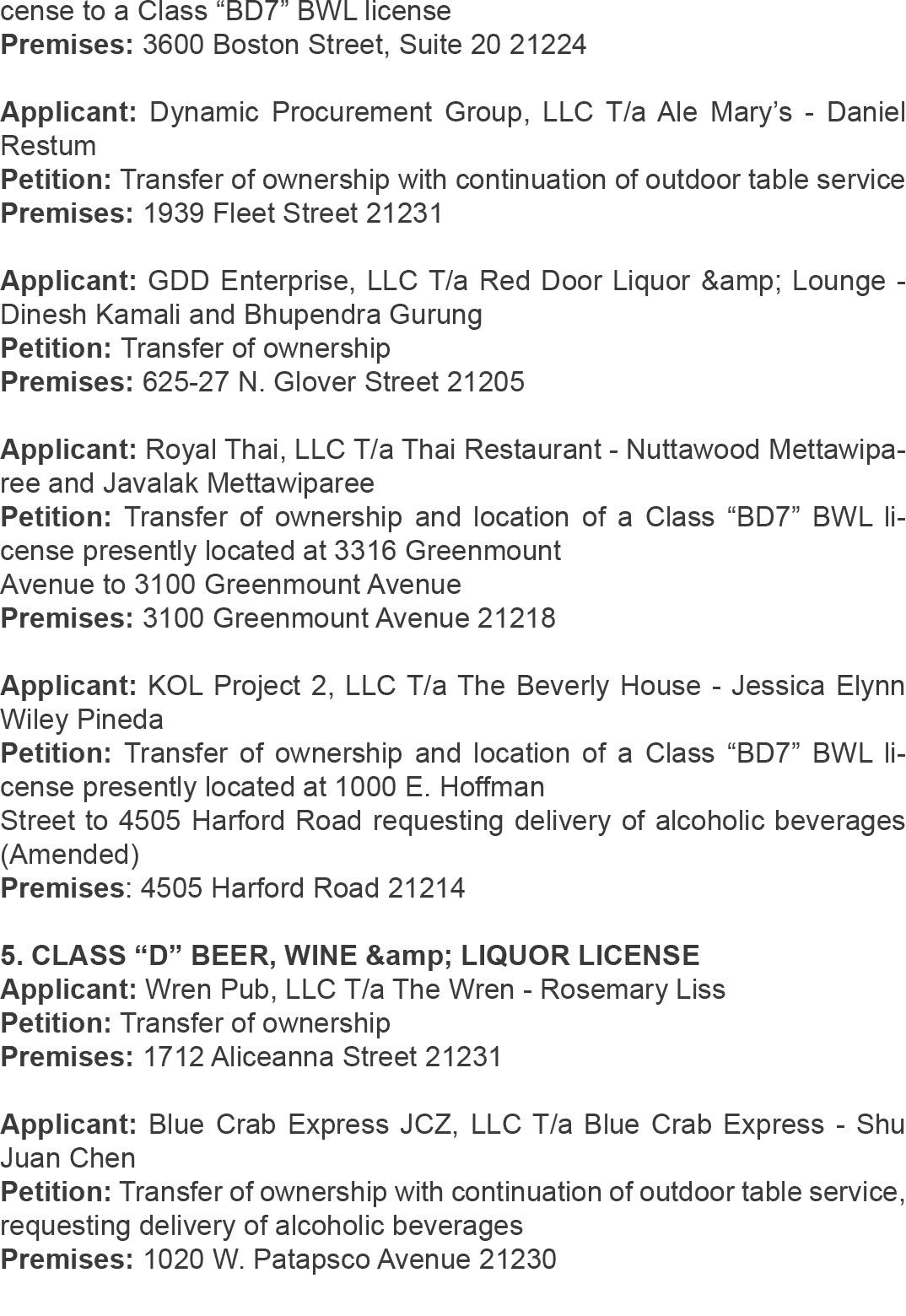




This week, the AFRO celebrates Juneteenth and the opening of the NNPA











This week, the AFRO celebrates Juneteenth and the opening of the NNPA





Sponsored by JPMorgan Chase & Co.
Homeownership has long been a reliable and valuable investment for many Americans. The Black homeownership rate in the U.S., however, stands at just 44% - the lowest among all racial groups according to the National Association of Realtors
A lack of access to credit, a lack of understanding about the homebuying process, and coming up with the upfront cash needed for a down payment and closing costs are among the barriers many Black Americans face on their journey to homeownership. That’s why it’s important to consider your options and seek out resources to help navigate the homebuying process.
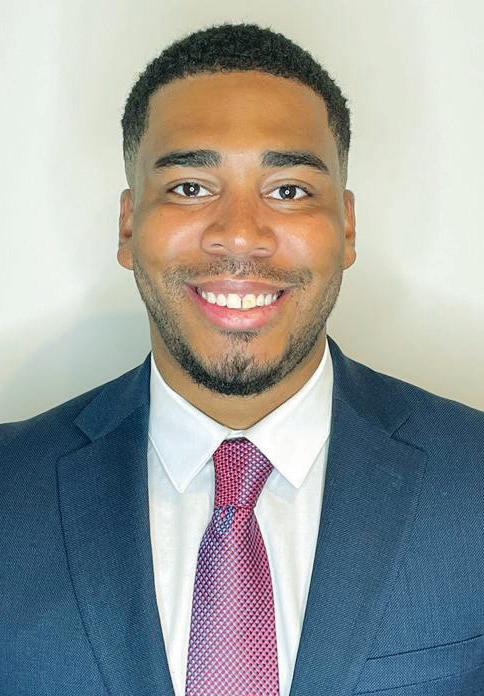
For National Homeownership Month, Justin Cotton, Chase Home Lending Advisor shared five important things to consider before purchasing a home.
1. Come prepared and don’t stress about rates. The best time to buy a home is when you’re financially ready. Worry less about the current economic environment and more about your own preparedness for homeownership, including fully knowing and understanding your financial situation, debt level, credit score, savings and investment positions.
2. Save for a down payment
A down payment is what you pay upfront toward the cost of your new home; it’s the difference between your mortgage amount and your purchase price. The more you can put down, the less you’ll be borrowing from a lender. However, it is a myth that you must put down 20% of the purchase price—low down payment loan options are available—in some cases, as low as 3%. Keep in mind that if you put less than 20% down, you may be required to pay private mortgage insurance. Make sure to speak to a Chase Home Lending Advisor to understand the options that may work for you.
3. Evaluate loan options and shop around. There are many different types of home loans available, and having an experienced Chase Home Lending Advisor on your side can help you make the right decision for you. Here are the most common types of loans:
• A conventional loan typically calls for a higher credit score to qualify and can be accessed through private lenders, including banks, credit unions, and mortgage companies.
• An FHA loan is backed by the federal government. These loans can help potential buyers with lower credit scores who wish to keep their down payment costs low. Buyers using an FHA loan are required to pay monthly mortgage insurance premiums, regardless of the down payment amount.
• A VA loan is a mortgage the U.S. Department of Veterans Affairs offers to servicemembers, veterans and surviving spouses. VA loans can have favorable terms, including no down payment.
• Your financial institution may also offer additional loan options. An example is Chase’s DreaMaker mortgage, which has flexible credit guidelines and requires as little as 3% down.


When companies team up for the greater good, incredible things can happen. CareFirst BlueCross BlueShield and Black Women Thriving East of the River are partnering to build stronger, healthier communities together.
Lastly, no matter the loan type you chose, it’s important to shop around for the best offer, both in terms of rate and other fees you may have to pay. All lenders and mortgages are not the same. For instance, did you know that, on average, homebuyers save more in mortgage fees with a bank like Chase, compared to a non-bank?
4. Use tools to help. It’s important to look into the financial resources available to help you purchase a home. Chase offers a homebuyer grant of up to $7,500 to buyers purchasing homes in eligible areas. These grants are offered in low- to moderateincome communities and neighborhoods that are designated by the U.S. Census as majority-Black, Hispanic and/ or Latino. The grant can be used to lower the interest rate and/or reduce closing costs or down payment. You can check grant eligibility online with the Chase Homebuyer Assistance Finder and also discover other financial assistance that may be available.
For added confidence during the closing process, Chase also offers a Closing Guarantee, which promises an on-time closing for eligible customers in as soon as three weeks, or the customer will receive $20,000 (for a limited time through July 27, 2024) if they qualify. The closing guarantee helps buyers close quickly, which can be very helpful in a competitive market.
5. Get educated.
Buying a home can be the achievement of a lifetime, but being able to sustain homeownership over time is equally, if not even more, important. For the best chances of success, homebuyers should not only get educated about the buying process, but also understand the ins and outs of homeownership after the home is purchased. Chase’s Beginner to Buyer podcast and its Homebuyer Education Center offers tips and first-hand experiences on homebuying, selling, and ownership.
Homeownership offers many benefits beyond just a place to live—it’s a time-tested way to start building personal and generational wealth. That’s why it’s never too early to start working toward your dreams of homeownership. After all, it’s an investment in your future.



Recently I was asked, “Why do we need Juneteenth? Aren’t Martin Luther King Jr. Day and Black History Month enough?”
I carefully explained – even though I was disturbed and perturbed by the question– that Juneteenth, MLK Jr. Day and Black History month are distinctly different. It was like asking why we recognize Memorial Day and Veterans Day. Don’t both have something to do with those who served in the Armed Forces? They do, but they are distinctly different and unique.
The same is true of Juneteenth, which addresses issues and celebrates victories that are not the focus of either MLK Jr. Day or Black History Month. Juneteenth stands on its own in terms of significance. Thus, President Joseph R. Biden had the wisdom and courage to declare Juneteenth a national holiday June 2021. All 50 states and the District of Columbia recognize Juneteenth as a holiday or observance.
Juneteenth speaks to aspects of American history, particularly African-American history, that are not fully covered by either MLK Jr. Day or Black History Month:
Juneteenth specifically celebrates the end of slavery in Confederate states that seceded from the Union, an event that has profound historical and emotional significance. It acknowledges the pain of slavery and the joy of freedom in a way that is not the primary focus of MLK Day or Black History Month.
Juneteenth highlights the fact that the themes of freedom, emancipation and the ongoing fight for civil rights are ever relevant. Juneteenth provides a moment to reflect on past injustices and consider the work that remains to achieve true equality.
Juneteenth is not just a historical commemoration but also a cultural celebration. It includes traditions such as community gatherings, music, food and education, enriching the cultural fabric of the nation.
Juneteenth, MLK Jr. Day and Black History Month each complement each other, together offering a more comprehensive understanding and appreciation of African-American history and contributions.
Having Juneteenth as a recognized holiday alongside MLK Jr. Day and Black History Month ensures that the full scope of

Your History • Your Community • Your News
The Afro-American Newspapers
Baltimore Office • Corporate Headquarters 233 E. Redwood Street 6th Floor, Suite 600G Baltimore, Maryland 21202
410-554-8200 • Fax: 410-554-8213 afro.com
Founded by John Henry Murphy Sr., August 13, 1892
Chairman of the Board/Publisher - Frances Murphy Draper
(Publisher Emeritus - John J. Oliver Jr.)
President - Benjamin Murphy Phillips IV
VP of Marketing and Technology - Kevin E. Peck
Director Digital Solutions - Dana Peck
Receptionist - Wanda Pearson - 410-554-8200, ext. 246
Director of Operations
Andrè Draper - 410-554-8200
Director of Finance
Bonnie Deanes - 410-554-8242
Executive Director/Director of Advertising Lenora Howze - 410-554-8271 - lhowze@afro.com
Director of Community & Public Relations
Diane W. Hocker - 410-554-8243
Editorial
Managing Editor - Alexis Taylor - 410-554-8257
Special Projects Editor - Dorothy Boulware - 410-554-8231
Editorial Assistant - Ama Brown-Parson
Archivist - Savannah Wood- 410-554-8277
Baltimore Circulation/Distribution Manager Andrè Draper - 410-554-8200
Production Department - 410-554-8200
Washington Office 1140 3rd Street, N.E., 2nd Floor Washington, D.C. 20002-6723 202-332-0080 • Fax: 410-554-8213
(Washington Publisher Emerita - Frances L. Murphy II)
Director of Operations - Andrè Draper - 410-554-8200
Customer Service, Home Delivery and Subscriptions: 410-554-8200


Dr. Frances “Toni” Draper, AFRO CEO and publisher, speaks on Juneteenth and the need for education– not just celebration– of the federally recognized holiday.
African-American history and the quest for freedom and equality are acknowledged and celebrated.
As frequent AFRO contributor, Dr. Karsonya Wise Whitehead wrote in a 2022 commentary “Even though the Emancipation Proclamation did not legally end slavery (that did not happen until Dec. 6, 1865, with the ratification of the 13th Amendment), Black people have used that moment and every moment since then to make America live up to its creed to be both the home of the brave and the home of the free.
Even though true freedom has yet to arrive, we recognize Juneteenth as a day of celebration, education and agitation. We mark this occasion with tears and with joy because we understand that we were not supposed to survive, but we did.”
It is with this understanding, that we produced this special edition highlighting the importance of Juneteenth and passing down Black traditions, five ways to honor the ancestors and Juneteenth books for young readers and teens.
Thanks to our advertisers, sponsors and AFRO Team members who contributed to this edition.
We want to congratulate our AFRO Juneteenth Breakfast honorees, Dr. Benjamin F. Chavis, Dr. Thelma T. Daley, Bobby Henry Sr. and the Root Branch Media Group. I would also like to extend a warm welcome to the leadership and members of the National Newspaper Publishers Association (NNPA) who open their national convention in Baltimore on June 19.
Happy Juneteenth!
“Struggle is a never ending process. Freedom is never really won, you earn it and win it in every generation.”
― Coretta Scott King, quote from “My Life With Martin Luther King Jr.”
Juneteenth is a defining moment for when Black people began their journey into freedom.
This Juneteenth, the AFRO looked at ways the Black community can reclaim their power and liberation by taking the time to honor the meaning of this holiday.
1. Embrace your community
Juneteenth is an African-American holiday that can be celebrated by all. Though the date has been celebrated in Texas since 1980, the holiday became a federal holiday in 2021. Last year, the Pew Research Center reported that “at least 28 states and the District of Columbia” officially “recognized Juneteenth as a public holiday – meaning state government offices are closed and state workers have a paid day off.”
Jo Von McCalester, Ph.D, a political science and Afro American Studies professor at Howard University, weighed in on how to embrace community on June 19.
“I want us to know and acknowledge what we are barbecuing for,” McCalester told the AFRO. “Tap into your community, because there are all kinds of celebrations happening. Individuals don’t have to create their own traditions around Juneteenth–at least not right now. They can join in with other groups that are celebrating. From there, they can get an idea of what is being celebrated.”
2. Know your history
“While history is what happened, it is also, just as important, how we think about what happened and what we unearth and choose to remember about what happened.”
― Nikole Hannah-Jones, excerpt from “The 1619 Project: A New American Origin Story”
In 2021, Governor Ron De Santis announced the STOP W.O.K.E Act, which “works to combat critical race theory practices and corporate wokeism.” His legislation put forth the narrative that slaves benefited from slavery because it afforded the opportunity to learn “useful skills.” In the past few years the Black community has seen their books banned and their history rewritten with outright lies being told in some classrooms. While Juneteenth is a holiday to celebrate freedom–it’s also a time to take advantage of the freedom to gain knowledge and dispel untruths.
This Juneteenth, take time to examine a part of Black history you are unfamiliar with or revisit an era you know from beginning to end– you may learn something new. The AFRO Archives and “1619 Project,” by Nikole Hannah-Jones, are the perfect places to start!
3. Document your story
The term “slave narrative” gained popularity in the 18th and 19th century as a surge of slaves documented their life experience in oratorical and rhetorical fashion, to the surprise of enslavers and bigoted Americans. The purpose was to not only shed light on the conditions of slave labor, but also on the humanities and capabilities Black people had in comparison to their White counterparts. The words of Frederick Douglas in “Narrative of the Life of Frederick Douglass: An American Slave,” as well as “Incidents in the Life of a Slave Girl,” by Harriet Jacobs, shook the country into a space of understanding and rebellion.

This Juneteenth holiday, take time to record your story and information on the life and times of your living relatives. Experts say journaling can help lower blood pressure, decrease depressive symptoms and improve overall well-being. The ancestors worked tirelessly and even risked their lives to gain the right to read, write, speak their minds and make meaning of their experiences– exercise your right today by recording your story.
4. Learn about traditional foods
On Juneteenth, the color red is used as a symbol of resilience and the bloodshed of ancestors. Hibiscus tea, also known as “sorrel” to West African families, is one traditional item to make this year on June 19. The recipe for sorrel has been orally passed down, keeping with tradition, and is made up of spices and herbs commonly found in the caribbean. Good fortune foods, such as black eyed peas or cabbage also symbolize Black tradition, passed on to instill hope.
5. Practice health and wellness
Within chattel slavery, inhumane and cruel living conditions and diets made up of nutrient-poor foods significantly impacted the well being and spirit of the Black body. Today, Black people are now actively fighting to improve their collective physical, mental and emotional health.
Many are using meditation or mindfulness practices to help rebalance themselves.
According to the National Library of Medicine, while African Americans report higher rates of chronic stress, “the practice of mindfulness meditation is largely underutilized in African American communities despite its potential health benefits.”
Krista Johnson, Ph.D, the director for the Center of African studies at Howard University, encourages the Black community to engage in wellness practices– especially the younger generation because she says “it hasn’t gotten enough attention.”
“You can’t underestimate breathing,” Johnson told the AFRO This Juneteenth, take time to truly understand how our ancestors survived enslavement and make a point to take better care of yourself. Remember, the healthier you are, the better you are able to live out the wildest dreams of your ancestors.

This week, I am wishing a Happy Father’s Day to every father, father figure and family. It is the joy of my life to be a father and a grandfather, and I cherish the honor and responsibility every day.
It is essential to give thanks to all the fathers –biological and otherwise – who are around us and in our lives day in and day out.
When a child steps into your world, your life changes forever. That new life is yours to oversee, guide, mentor and protect. As all fathers know –there are no limits to the ends that a man will go to ensure his child’s health, safety and security.
But fatherhood is not without its challenges. With the addition of new life comes unforeseen tests. It is not just the blossoming of a new relationship between father and child, but a new chapter in your relationship with the world around you. We are tested as men and challenged to overcome the day-to-day obstacles of fatherhood. But when we are successful in this pursuit, we become an evolved version of ourselves.
In the harsh reality of life, situations and circumstances can get out
of control. Oftentimes, they will get in the way of our journey through life as fathers.
The infamous government “man in the house” rules of the 1960s were a case in point. Those government regulations mandated that a child –who otherwise qualified for public assistance – be rejected if there was a single or married ablebodied man living in the home. That rule hastened the disintegration of Black families during that era and was punitive, mean and short-sighted. Our government system of public assistance is designed to ensure that all Americans are able to receive basic human needs. Hindering those who rely on these
benefits to live, simply because they have a father figure present, was unquestionably wrong. While the U.S. Supreme Court struck down this rule in 1968, I know that this inhumane policy took a toll on those Americans who were subjected to its harsh penalties.
In my capacity as both a father and an elected official, I have worked tirelessly to champion the voices and needs of fathers, mothers, children and families. I have sought to protect the most vulnerable among us and work legislatively to support all fathers and father figures across our nation.
In just this year alone, I successfully worked with others to secure hundreds


of thousands of dollars in Community Project Funding to support those purposes. This direct federal funding will expand and improve a number of family-related efforts, such as the LIGHT Rock Children’s Village in Baltimore, allowing for increased enrollment in early childhood education efforts. These investments are a commitment to supporting our children’s futures, which I know is principal in the minds and hearts of fathers across our nation.
Equally as important were the successful efforts to enhance the Child Tax Credit passed as part of the American Rescue Plan in Congress. Family support measures such as this are the building blocks which bolster fathers and fatherhood by lifting millions of children out of poverty in 2021 alone.
As a community, we must always encourage the roles of both fathers and mothers in a society where unfortunately families face harsh scrutiny and are devalued
In 1865, over 159 years ago, the U.S. eliminated or outlawed slavery in the U.S. with the passage of the 13th Amendment to the U.S. Constitution. One of the promises and pledges to freed slaves was that each would receive 40 acres and a mule. This commitment would help former slaves with building a home, raising a family and growing wealth through land ownership and entrepreneurship. While some Black Americans were able to receive land in the 1860s and 1870s, unfortunately, many former slaves nor their descendants ever received land. In fact, many Black Americans that were given land were chased off their land with force and brutality from the Ku Klux Klan (KKK) and other White supremacy organizations.
Still to this day the dream of land and homeownership continues to be elusive for Black Americans from slavery, post slavery, the Jim Crow
Era, the Civil Rights Era to the present. Whether it was the trick bag of sharecropping, land contracts, subprime loans, eminent domain policies or outright redlining of Black neighborhoods by banks and government organizations, it should not come as a surprise that there continues to be a persistent 30-point racial gap in homeownership rates in the U.S.
Racial disparities in homeownership is at the core of wealth inequality in this country. You can’t separate the two. America is anchored in home and land ownership: always has been, always will be. In fact, for many years, only White men that owned property could vote in the U.S.
Below are several strategies to help grow Black homeownership in the U.S.:
Federal student loan forgiveness for purchasing a home
African Americans are disproportionately impacted by student loan debt forcing many to
forgo homeownership. A program that addresses this disparity and forgives student loan debt would help many Black Americans achieve their homeownership dreams.
Create down payment assistance and federal housing programs for Black descendants of slavery
Currently there are initiatives and dedicated federal housing and mortgage lending programs and incentives for Native Americans. Similar efforts should be established for Black Indigenous People of Color (BIPOC) that are descendants of slaves in America.
Create federal and state homeownership zone programs in communities with persistent low rates of Black homeownership, especially in formerly redlined communities
Intentional efforts to invest in rehabilitation of existing homes, coupled with infill housing, funding for homebuyer
education, downpayment and closing subsidies, special purpose mortgage credit programs, energy efficiency grants and property tax incentives would have a huge impact on increasing Black homeownership.
Despite the current historically low rate of Black unemployment in the U.S., high mortgage interest rates are limiting the potential for increasing the growth rate of Black homeownership. According to data from Freddie Mac, there are over two million mortgage/credit eligible potential Black American homebuyers in the U.S.
Increase the number of Black real estate agents, appraisers, loan officers and underwriters
The housing ecosystem sorely lacks diversity. Underrepresentation in these key professions plays a major role in housing discrimination, redlining, bias in mortgage lending and
the undervaluing of properties owned by Black Americans.
It’s important to note that Juneteenth and homeownership month
at times. We know that by supporting fathers and fatherhood we are also guaranteeing a future that is directly opposite of the aforementioned government policy and attempts of the 1960s to tear down that future. On this Father’s Day, let us support and continue to encourage all of the dads who have answered the call of being a guardian, leader, teacher, mentor and most of all father to the children of our communities.
are in the same month. Hopefully, one day, the promise of land and home ownership will be realized equally and equitably for Black Americans.


Juneteenth, celebrated on June 19, commemorates the day that Union troops arrived in Galveston, Texas in 1865 to declare the freedom of some 250,000 enslaved African Americans in the state. Two years prior, President Abraham Lincoln issued the Emancipation Proclamation, which gave freedom to enslaved people in Confederate states that seceded from the Union during the Civil War.
According to the National Archives, on June 19, 1865, “U.S. Maj. Gen. Gordon Granger issued General Order No. 3, which informed the people of Texas that all enslaved people were now free.”
The holiday is known by a variety of monikers, like “Jubilee Day,” “Black Independence Day” and “Freedom Day.” In 2021, President Joe Biden made Juneteenth a federal holiday.
“One of the most important things about Juneteenth is that its rise was meteoric. The fact that it was established as a federal holiday only partly speaks to
American mind.”
“The codification of it into federal law has elevated it as a holiday like we’ve seen no other— it being celebrated almost instantly nationwide,” continued Cohen. “The history is also being retold and learned by generations who have never heard of it.”
Cohen learned about Juneteenth as a young child, before he could really grasp the significance. His mother was born in Houston, Texas, just two blocks away from Emancipation Park, which was created in 1872 to hold Juneteenth celebrations.
He said people often mistake the holiday for the end of slavery, but that wouldn’t come until December 1865 with the


Diversity.fnal.gov
The Juneteenth flag is a creation of Ben Haith, founder of the National Juneteenth Celebration Foundation, and artist Lisa Jeanne Graf. Designed in 1997, it combines the red, white and blue of the American flag with an arc that represents new horizons, the five-point Texan star and a bigger star that signifies the spread of freedom.
passing of the 13th Amendment.
“Lincoln’s proclamation effectively didn’t free slaves anywhere. It was more symbolic. It was aimed at people enslaved in the Confederate or rebel states, which Lincoln did not have control over,” said Cohen. “But, it sent a very clear message that the Union was fighting for the end of slavery where it existed.”
Maryland was a border state during the Civil War. Although it was a slave state, Maryland
“Soon after the proclamation, we start to see that men are being enrolled in the United States Colored Troops,” said Armenti. “In Maryland, we see a lot of individuals either selfemancipating by going to places like Baltimore or Washington D.C. where there is a federal government presence or we see individuals being freed, manumitted and enlisted.”
In November 1864, the state of Maryland enacted a new constitution, which officially
Armenti. “It was a very close vote.”
Although Juneteenth marks a significant turning
“Juneteenth is an opportunity for communities to be reminded of that long road out of slavery and to envision who they want to be as Americans.”
point in American history, its acknowledgement has been limited in years past— especially outside of Black communities. Cohen attributed this to a dearth
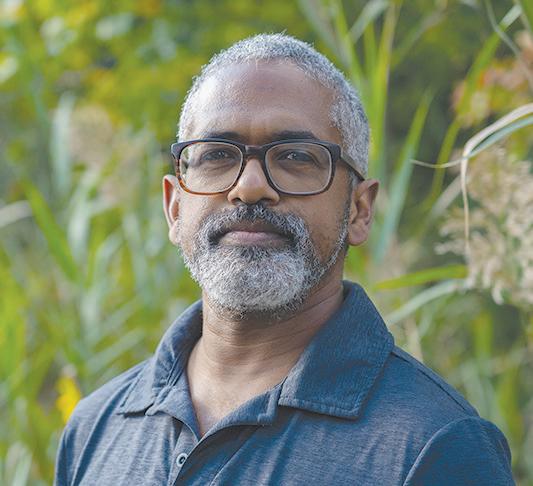
Cohen is a historian and the president of the Menare Foundation, which seeks to maintain the legacy of the Underground
of education about the holiday’s history.
“So little of the AfricanAmerican angle on American history has been taught in our schools. As time’s gone on, it’s clearly been taught more and more, unless you live in a state where there’s a broad assault on both Black history and Black people in general,” said Cohen.
“However, I do think Juneteenth has been able to leapfrog from its almost unknown status to being a premier holiday.”
Cohen said Juneteenth is a time for gathering with community, friends and family.
He said people celebrate the holiday with reflection, singing Black spirituals, historical reenactments and food. His organization will host a Juneteenth 6K and 12K race to commemorate the holiday this year in Germantown, Md.
The Juneteenth flag is also flown. It features the red, white and blue of the American flag, an arc that represents new horizons, the five-point star of Texas and a bigger star that symbolizes the proliferation of freedom, according to the General Services Administration.
“Juneteenth is an opportunity


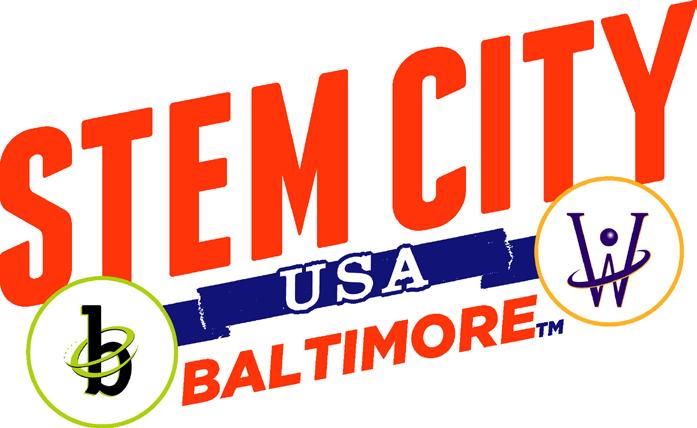


Juneteenth is widely celebrated within the United States, marking the day that freedom reached all slaves in Confederate states during the American Civil War. Ultimately, chattel slavery was outlawed by the 13th Amendment, and Black people in the United States were able to shed the bonds of slavery in 1865. Though the story of the African Diaspora includes a variety of independence days, Juneteenth is unique to African Americans.
While many would agree that the holiday should be observed solely by African Americans, others believe it represents a larger meaning of freedom and equality and can be celebrated by all beyond the nation’s border.
“Juneteenth commemorates the day when 250,000 slaves in the state of Texas, which became the last bastion for slavery during the final days of Civil War, were declared free by the U.S Army,” said Professor of Practice at the Morgan State University, Wayne Dawkins.
“I see the holiday as a teaching moment, I believe it’s important that the people within the African Diaspora know the history of slavery and the struggles of their ancestors.”
The celebration of this holiday began in 1866, when Texas hosted their Juneteenth festivities, which included prayer gatherings, and the wearing of new garments as a symbol of liberation. The celebration has now grown to include speeches, family get-togethers and educational activities.
Opal Lee is recognized as the “Mother of Juneteenth,” for her campaign to get national recognition for the holiday, which became an official federal holiday in 2021 after being a state holiday in Texas for more than 40 years.
While Juneteenth is well-known and celebrated within the African-American community, many Americans were unaware of the holiday before 2021, and others are still in the dark about the true history of the event.
Tyra-Neil Morrison an information systems and technology student at Morgan State University (MSU)
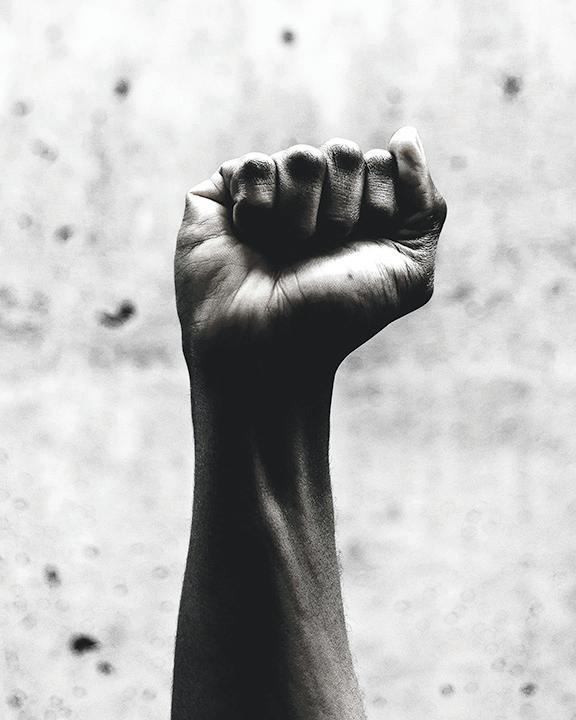
Though other members of the African Diaspora celebrate their respective independence days, Juneteenth is a celebration unique to the African-American community in the United States.
and the president of the university’s Caribbean Student Association (CSA) said she “didn’t really know much about certain Black American cultures and customs,” she only learned about Juneteenth when she started college.
“My knowledge expanded when I came to an HBCU (Historically Black college or university). My friends that were from different backgrounds would invite me to their [homes] for cookouts and to talk about Black history,” said Morrison.
She said even though her native country does not

celebrate Juneteenth, she believes the holiday should be put in school curriculums to educate students.
Morrison, who is of Jamaican descent, said that instead of recognizing Juneteenth, there are celebrations of Jamaican independence on August 6 of each year.
“I’m
not telling anyone not to celebrate Juneteenth, but I just want them to be aware of the meaning of it and why we have it.”
Black nations around the world have independence days that vary from country to country. In the Caribbean, the Haitian Revolution took place from 1791 to 1804. Haitians gained their independence on Jan. 1, 1804.
In Africa, the nation of Nigeria gained independence on Oct. 1, 1960, just a few years after Ghana, which gained independence on March 6, 1957.
President of the African Student Organization at Morgan State University, Afia-Ayisha Doreen Andoh, of Ghana, shared her views on the subject. Andoh believes Juneteenth should only be celebrated by African Americans in the United States as it represents a time when slavery was legal in the U.S.
“I think it’s important to be celebrated by the U.S., but not necessarily through Africa and Caribbean countries. [Juneteenth] is mainly for the slaves in the U.S. because when U.S. slaves were freed, there were still some African countries that were enslaved,” said Andoh.
Andoh believes Juneteenth is a necessary celebration, but not for individuals outside the U.S.
Despite the different views on the celebration of Juneteenth, Dawkins argued that the holiday should be used as a teaching method. He believes the holiday should be “commemorated and not celebrated.”
“I’m not telling anyone not to celebrate Juneteenth,” said Dawkins, “I just want them to be aware of the meaning of it and why we have it.”
BGE celebrates Juneteenth as an important point of reflection for all Americans — a time to understand that the struggle against racial injustice is far from over, and that we must all work for true equality. At BGE, we’re all in as we embrace a culture of respect, equity, and inclusivity. We’re working together with our employees and our customers to build on what’s important to everyone. bge.com/Diversity


Returning to college can be a transformative step for adults seeking to advance their careers, and Morgan State University’s College of Interdisciplinary and Continuing Studies (CICS) is here to make that journey as smooth and supportive as possible. With a diverse range of degree programs and a commitment to individualized student support, CICS is the ideal choice for adult learners aiming to complete their education and unlock new career opportunities.
Launched in 2021, CICS offers 18 degree programs across undergraduate, master’s, and doctoral levels, specifically designed to cater to nontraditional students, working professionals, and those seeking distance education. The college’s flexible and accommodating approach allows students to tailor their programs to fit their unique lifestyles and responsibilities, making higher education accessible to all.
One of the standout features of CICS is the personalized support each student receives. From the moment a prospective student expresses interest, they are treated as an individual. Our

dedicated staff works one-on-one with students, offering guidance and support from application through to graduation. This relationship-focused approach is central to our mission and has been a key factor in the success of our students.
CICS’s degree programs span a variety of fields, including Technology Services, Health and Human Sciences, Engineering, Information and Computational Sciences, and more. With these programs, students can gain the knowledge and skills needed to thrive in today’s competitive job
market.
“We understand that adult learners have different needs and challenges compared to traditional students. That’s why we offer flexible course schedules, including hybrid, remote, evening, and weekend classes,” says Laquetta Bryant, Senior Admissions Recruitment Advisor. “Our goal is to meet students where they are and help them succeed on their own terms.”
The college also offers generous transfer credit policies. Students can transfer up to
90 credits from any regionally accredited institution, and those currently employed can convert their work hours into academic credits, providing significant financial benefits and accelerating their path to graduation.
In addition to the supportive learning environment, CICS has eliminated the application fee, making it easier for students to take the first step toward achieving their educational goals.
The application deadline for the Fall 2024 semester is July 15, 2024, giving prospective students ample time to prepare and apply.
Your future is within reach.
Take the next step toward a fulfilling career by enrolling
at Morgan State University’s College of Interdisciplinary and Continuing Studies. For more information and to schedule a one-on-one meeting with an admissions counselor, visit morgan.edu/CICS.
Don’t miss out on this opportunity to transform your life through education. Apply today and join a community that is committed to your success.
Contact Information
Morgan State UniversityCollege of Interdisciplinary and Continuing Studies Website: morgan.edu/CICS
Email: mcy@morgan.edu Phone: 443-885-4779
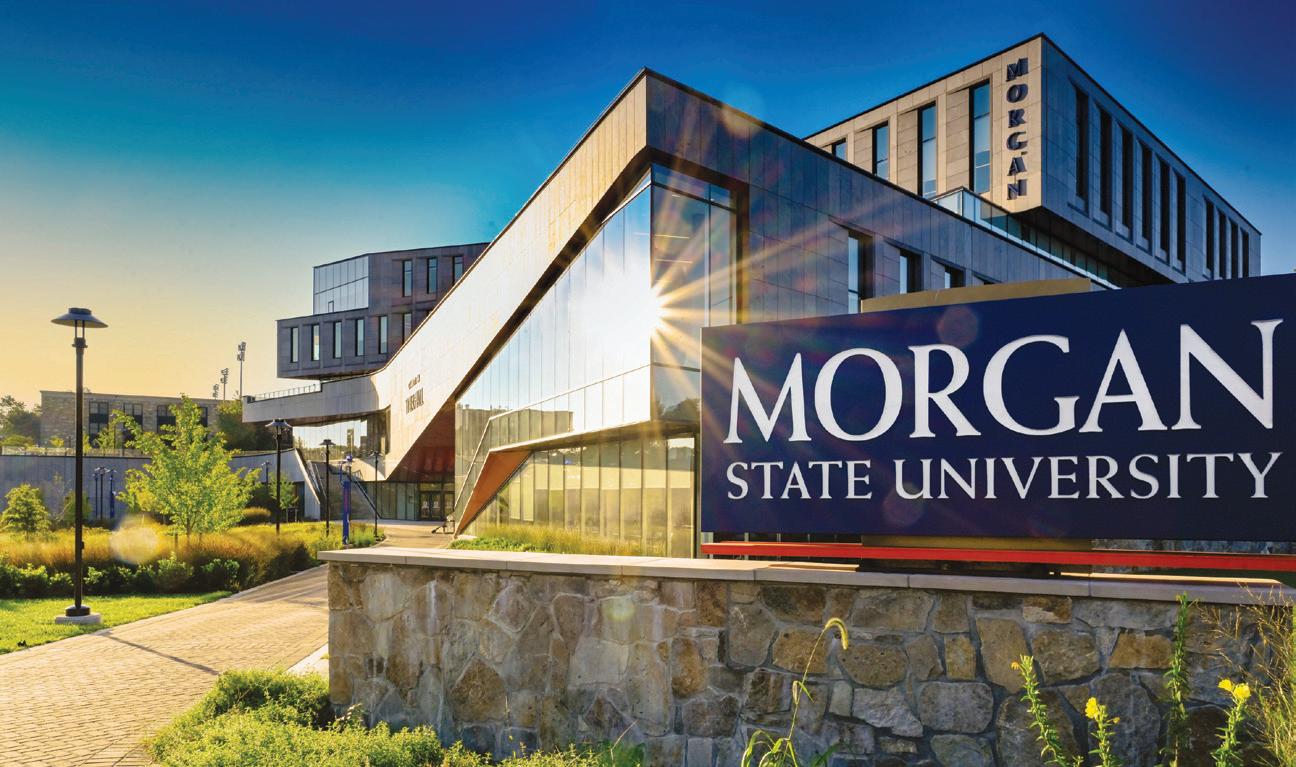




AFRO News, Maryland’s oldest Black owned business, is set to host their second annual Juneteenth breakfast on June 19. The event will celebrate the Black Press at the Center Club, located at 100 Light St., #16 Baltimore, MD 21202 from 8 a.m. to 10 a.m.
Karsonya “Dr. Kaye” Wise Whitehead, founding executive director of The Karson Institute for Race, Peace and Social Justice, will serve as the keynote speaker for the event.
Several industry leaders and trailblazers will be recognized for their work in the Black press, including Dr. Benjamin Chavis Jr., CEO and president of the National Newspaper Publishers Association (NNPA), Bobby Henry Sr., NNPA chairman, Dr. Thelma T. Daley, educator and community activist and Root Branch Media Group.
In addition to celebrating the Juneteenth holiday, this year’s breakfast will also kick-off the 2024 Annual NNPA’s National Convention, taking place in Baltimore from June 19-22.
“The Black Press is an integral part of celebrations and freedom and that’s what Juneteenth represents,” stated Dr. Frances “Toni” Draper, AFRO publisher and CEO. “This Juneteenth the Black
Press is convening in Baltimore for its national convention through the National Newspaper Publishers Association.”
This year’s honorees represent the past, present and future of the Black press.
Both Chavis and Henry hold leadership positions within the NNPA, Daley is a long-time supporter and advocate of the Black Press and Root Branch is helping shape the next generation of the Black press.
“There’s no other entity, other than the Black Press who devotes all of its coverage to Black causes, to Black people,” Draper explained while discussing the importance of the Black press. “You don’t have to be famous to be in the Black press, you don’t have to commit a crime to get into the Black press. Support the Black Press and don’t take it for granted.”
See more on afro.com

The AFRO is excited to host the second annual Juneteenth breakfast on June 19 from 8 a.m. to 10 a.m. at the Center Club located at 100 Light St., #16 Baltimore, MD 21202 . The event will take place the same day as the opening of the NNPA 2024 Annual National Convention.

As Juneteenth approaches, the AFRO is honored to highlight the leaders who have made change in the community. From civil and human rights to change in the classroom, Dr. Thelma Thomas Daley, has made an indelible impact on people from all different walks of life. This year, she will receive recognition at the AFRO News annual Juneteenth breakfast.
Dr. Daley is a renowned counselor-educator, organizational leader, college professor and activist. She has devoted her career to empowering others through her professional, charitable and public service endeavors.
In 2020, she was inducted into the Baltimore Gas and Electric (BGE) and Baltimore Sun’s Business and Civic Hall of Fame. Daley was also listed in 2023 as a distinguished alumna of Bowie State University. In April 2024, the American Counseling Association at its national convention unveiled the Thelma Thomas Daley Advocacy and Equity Award. She is a commissioner on the Baltimore Architectural and Engineering Commission. She has served as president of five national organizations. In January 2023, she completed a phenomenally successful term as the eighth
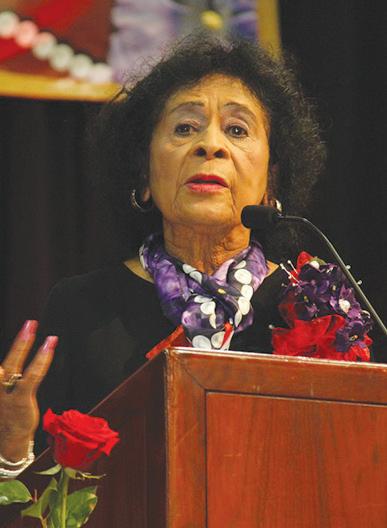
Dr. Thelma Thomas Daley, the director of Women in NAACP, is just one of the honorees for the 2024 AFRO Juneteenth Breakfast. Daley has served as the eighth national president and chair of the National Council of Negro Women and as the 16th national president of the Delta Sigma Theta Sorority.
president and chair of the National Council of Negro Women.
Dr. Daley broke racial barriers in the American School Counseling Association, the largest counseling association in the world, as the first AfricanAmerican president in the 1970s. At the time, she was only the third woman to lead the organization. She also had a long professorial tenure with Loyola in its graduate school
counseling program. Other professorial roles have included serving at her alma mater, George Washington University, and the Harvard University Summer Institute for Counselors. She has contributed as a member of several local and national boards, including Saint Agnes Hospital, the Carrollton Bank (now WesBanco), Education Testing Service (ETS), College Board, the National Board for Certified Counselors and the State Council on VocationalTechnical Education. She currently serves on the national board for the National Shrine of Saint Elizabeth Ann Seton. In September 2023, the secretary of the United States Department of Interior appointed her to the National Historic Site Advisory Commission for the Mary McLeod Bethune Council House.
Dr. Daley has conducted workshops or given speeches in the U.S. and in Africa, Europe and Asia. She has touched the lives of many through her counseling and organizational leadership and remains a strong advocate for equity and social justice. For her hard work and dedication, the AFRO is proud to honor Dr. Thelma Thomas Daley.
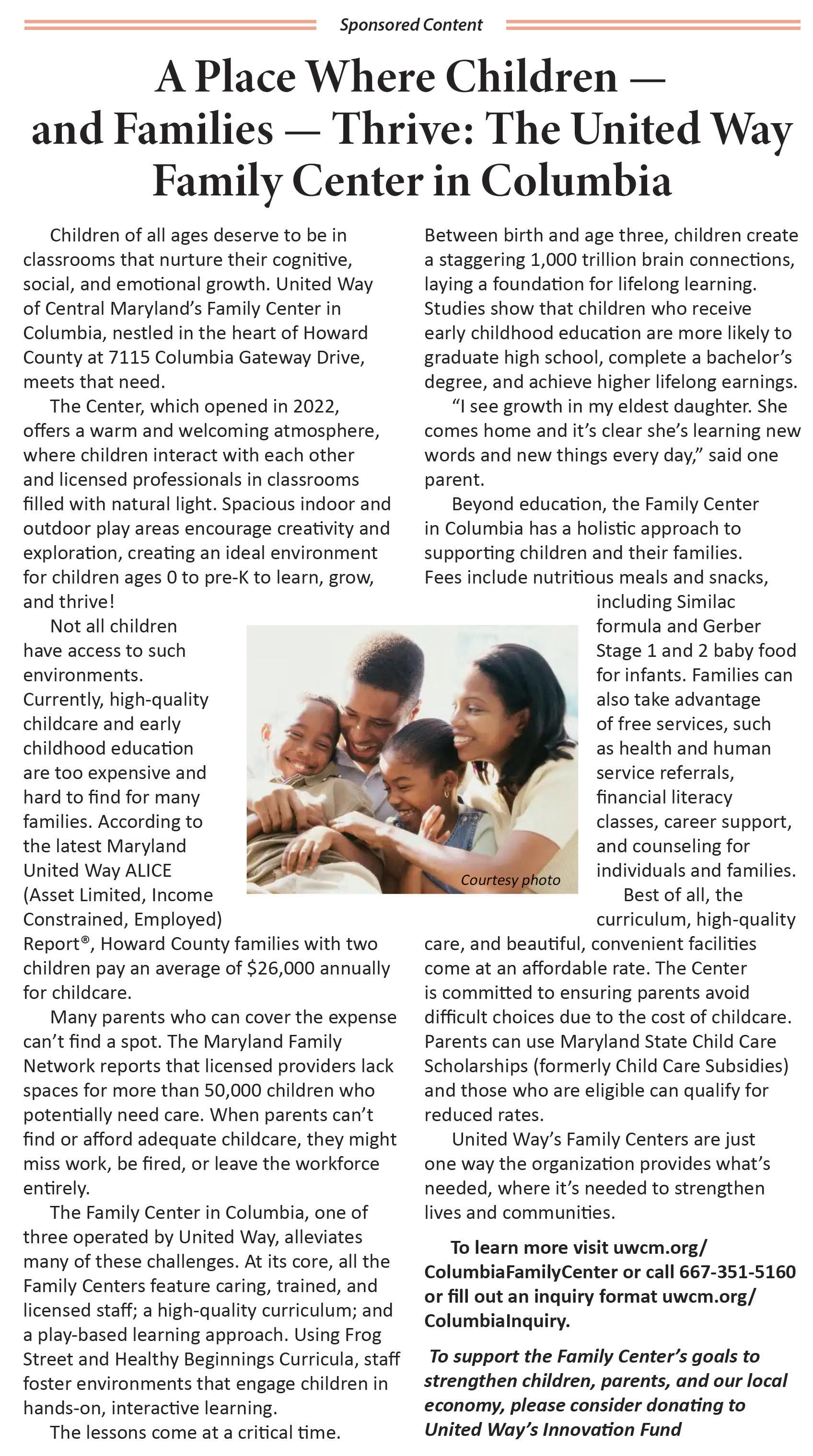

Dr. Benjamin Franklin Chavis Jr. is a civil rights leader, United Church of Christ (UCC) ordained minister, author, journalist, organic chemist, environmentalist, global entrepreneur and since 2014, president and CEO of the National Newspaper Publishers Association (NNPA) based in Washington, D.C.
The Chavis family has been deeply rooted in the “freedom movement” in Granville County, North Carolina for over 250 years as landowners, farmers, educators, theologians, physicians and activists. Dr. Chavis is the great-great-greatgrandson of the Rev. John Chavis (1763-1838), the first Black American to both attend Princeton University and be ordained a Presbyterian minister in 1799.
In his youth in the early 1960s, Dr. Chavis was the North Carolina statewide
youth coordinator and Southern Christian Leadership Conference (SCLC) assistant to Martin Luther King Jr., who inspired him to work and to become a Christian minister in the Civil Rights Movement, and later to champion African liberation in Angola, Namibia, South Africa and in the Democratic Republic of the Congo (DRC). Dr. Chavis became an active supporter and associate of the African National Congress (ANC) led by Oliver Tambo and Nelson Mandela.
At the age of 24, Dr. Chavis rose to international prominence in 1972 as leader of the Wilmington Ten in N.C., civil rights activists who were political prisoners as designated by Amnesty International and who were unjustly convicted of committing arson and sentenced to a total of 282 years in prison. The Wilmington

Ten convictions and sentences were appealed and eventually overturned in 1980 by the U.S. Fourth Circuit Court of Appeals due to unconstitutional systemic racism and “prosecutorial misconduct.” During Chavis’ frontline foot-soldier civil rights career, he has been unjustly
charged, arrested and jailed over 67 times, and was in each case subsequently found not guilty or dismissed as unjustly charged.
Dr. Chavis went to graduate school in the field of civil rights as a minister and a program director of the United Church of Christ Commission for Racial
Justice under the leadership of another mentor, the Rev. Dr. Charles E. Cobb Sr. Chavis received the Master of Divinity (magna cum laude) from Duke University (1980) and a Doctor of Ministry from Howard University (1981).
In 1993, the national board of directors of NAACP elected Dr. Chavis as the youngest executive director and CEO of America’s oldest national civil rights organization.
Dr. Chavis actually began his journalistic career at the age of 11 while in the sixth grade. He wrote weekly news stories about Black youth activism for The Carolina Times, published by one of the leading members of the NNPA, Louis E. Austin, in Durham, N.C.
In 1982, Dr. Chavis was the first person to coin the term environmental racism during environmental justice protests in Warren County, N.C. Over the
past four decades, Dr. Chavis has emerged as the “Godfather of the Environmental Justice Movement” that has evolved into an effective worldwide movement for environmental and climate justice and equity. In 1992-1993, Dr. Chavis served as a member of the Clinton-Gore Transition Team and later became an active member of the President’s Council on Sustainable Development. Dr. Chavis was also the national director of the successful Million Man March on October 16, 1995, in Washington, D.C., the largest African-American event mobilization in the history of America.
Dr. Chavis has four sons: Benjamin III, Franklin, John Mandela and Reginald Louis. He has four daughters, Michele, Paula, Renita and Ana Elisabeth. He is a grandfather and a great grandfather.
This week, the AFRO continues to celebrate Black excellence and the Juneteenth holiday by honoring Bobby R. Henry Sr., publisher and CEO of the Westside Gazette Newspaper.
The Westside Gazette Newspaper was started by Bobby R. Henry Sr.’s parents, Levi and Yvonne (now deceased) in February 1971 in the Florida Room of their home using his sister’s typewriter. His parents’ passion to portray the African-American community accurately led them to working 12 to 16 hour days while raising seven children.
“This paper will be black, it will be white, and it will be read,” Levi Henry wrote in the paper’s first editorial.
Although there was a time he wanted nothing to do with the paper, he wrote in a second grade paper that he wanted to
be a messenger, never knowing it would lead him toward helping his father fulfill his dream of owning their own printing press by 1982. It was a family team. His father sold advertising, his mother edited the news and his aunt, Dorothy Dillard, was responsible for daily operating tasks. Now the third generation of Henrys are managing and operating the business, of which Bobby Henry is publisher and CEO. He earned an undergraduate degree in sociology from Florida Memorial College and pursued graduate studies in special education at St. Thomas University in Miami.
Besides being appointed by Gov. Jeb Bush (R-Fla.) to sit on The Florida Black Business Investment Board, he has been active on numerous boards, including the Negro Chamber of Commerce and the National
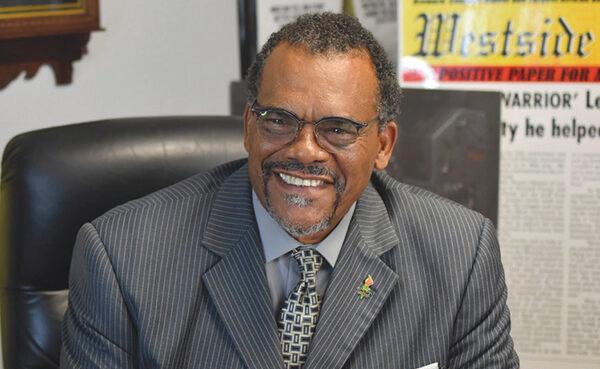
Newspaper Publishers Association (NNPA), the Black Press of America. He is a lifetime member of the NAACP, a deacon at New Mount Olive Baptist Church and a life member of Omega Psi Phi Fraternity. He is also the current president of The
Florida Association of Black Owned Media.
One of his dreams is to create an Urban Black Press Institute housed in the Yvonne Henry Building as an initiative of the Westside Gazette to educate and expose urban youth to journalism to ensure
that the legacy of the Black Press continues. This will be the first Black journalism institute of its kind in South Florida.
When the Westside Gazette celebrated its 50th Anniversary, it was recognized as Broward County’s oldest and largest African-American owned and operated newspaper. “It made us proud of the contributions and support we have rendered to our community. In times of hurt and betrayal we have cried together, we have stood shoulder to shoulder in struggles and successes, locked arm in arm and we shall overcome together,” Henry said in a statement.
Henry has been recognized with an Omega Psi Phi Fraternity Brotherhood Award; an NAACP Fort Lauderdale Branch Continuous Support Award; the Dr. Martin Luther
King Jr. Memorial Committee Community Service Award; the Blades Foundation Builders of Dreams Award; a Nova Southeastern University Outstanding South Floridian Award; the Dr. James F. Sistrunk Award; the Links Broward County Chapter Pillar of the Community Award; the National Association of Black Journalists Community Service Award; the JM Family African American Achievers Award and the Florida Conference of Black Legislators Award. He has also received a citation for outstanding public service in support of the United Nations and has been added to Success Magazine South Florida’s list of 50 Most Influential Black Professionals.
Bobby Henry Sr. is married to Broward County Administrator Bertha W. Henry, and they have four children.
The CEO Club; the National Coalition of 100 Black Women; the National Association of Black Journalists (NABJ); the Baltimore Association of Black Journalists (BABJ); the Baltimore City Chamber of Commerce; the National Association of Women Business Owners (NAWBO) DC, Distinguished Toastmaster and former White House Intern for the Clinton Administration in 1999.
an alum of the 2023 Baltimore Leadership Class, and an alum of the Goldman Sachs 10KSB Program – Baltimore. Pettigrew is a member of
In February 2024 Pettigrew made history. Kicking off Black History Month, she was recognized by elected officials in the City of Baltimore and State of Maryland as the first African-American woman of Maryland to buy a block along Baltimore’s waterfront. In 2023 she received an honorary doctorate degree in business philosophy from Trinity International University of Ambassadors (TIUA). Also, in 2023 she was named to the list of Top 100 Women in Maryland by the Daily Record and received the Women of Vision Award by the Women in Film and Video (WIFV) in Washington, D.C. Other recipients of this distinguished award include Cicely Tyson,

Ruby Dee, Gwen Ifill, Penny Marshall and Tipper Gore. Dr. Pettigrew has recently been appointed to the Board of Directors for the Red Cross of Central Maryland. She has been mayoral appointed to the City of Baltimore Workforce Development Board. She also currently sits on the
and Coppin
— and the


Juneteeenth is a time of celebration, recognizing the day that enslaved African Americans in Texas learned they were free. Though millions of slaves in Confederate territory had been freed on Jan. 1, 1863, slaves in Texas did not receive word of new law until June 19, 1865.
Now that Juneteenth is officially recognized as a federal holiday, people across D.C., Maryland, Virginia (DMV) and surrounding areas are taking time to celebrate with a series of different events to commemorate the occasion. This week, the AFRO compiled info on events set to take place throughout the week of Juneteenth. Take a look below to find an event that’s happening near you!
Baltimore
AFRO Juneteenth Breakfast
The AFRO will host its annual Juneteenth breakfast at the Center Club in downtown Baltimore under the theme, “Celebrating the Black Press.” Karsonya “Dr. Kaye” Wise Whitehead, Ph.D, will serve as keynote speaker for the celebration. This event will honor community leaders and a local media company for their ability to make change in the community. This year’s honorees are Dr. Benjamin Chavis Jr., Bobby Henry Sr., Dr. Thelma T. Daley. and the Root Branch Media Company.
Date: June 19
Time: 8 a.m. - 10 a.m.
Location: The Center Club
Legg Mason Building
100 Light Street #16
Baltimore MD, 21202
Cost: $85 per person
Please contact Diane Hocker at DHocker@afro.com for ticket inquiries.
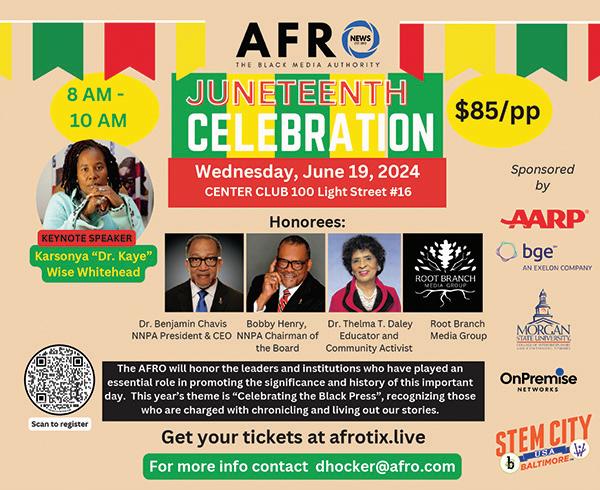
A series of community leaders such as NNPA CEO and President Dr. Benjamin Chavis, NNPA Chairman Bobby Henry Sr. and legendary civil and human rights activist Dr. Thelma T. Daley, will be honored at the AFRO’s annual Juneteenth breakfast. The breakfast, which will also honor Root Branch Media Group, is set for June 19 at The Center Club’s Legg Mason Building in downtown Baltimore.
In Celebration of Juneteenth
The Enoch Pratt Central Library will host a presentation about Juneteeenth with local historian Bradley Alston. Make sure to stick around for the question and answer session afterward.

Date: June 18
Time: 7 p.m.
Location: Enoch Pratt Central Library (Poe Room) 400 Cathedral Street Baltimore MD, 21201
Cost: Free
Freedom’s Voices from Jubilee to Reparations
The Reginald F. Lewis Museum will host a mixture of events for the history, music and theater buffs in the family. The celebration will include a presentation about emancipation with documentary story quilter, Dr. Joan M. E. Gaither. The visitors will be able to create their own quilt square commemorating the day, and the event will also feature a musical performance by The Carter Singers, including monologues recited by local youth that were co-written by hip hop artist wordsmith, and lastly, a panel discussion with filmmaker John Comer. Refreshments will be provided first come, first serve.
Date: June 19
Time: 11 a.m. - 5 p.m.
Location: The Reginald F. Lewis Museum 830 East Pratt Street Baltimore, MD 21202
Cost: Free
Juneteenth Freedom Celebration
Join the Anacostia Community Museum on June 19 in the nation’s capital if you’re looking for a fun way to celebrate. Attendees are asked to bring their own food and beverages, but open grilling is not allowed. The day also includes a lineup of musical performances by R&B singer Alex Vaughn, and other artists such as DuPont Brass, CuzzinB, Noochie and the Too Much Talent Band. All visitors are required to register online.
Date: June 19
Time: 10 a.m - 5 p.m.
Location: Anacostia Community Museum 1901 Fort Place SE Washington D.C. 20020
Cost: Free
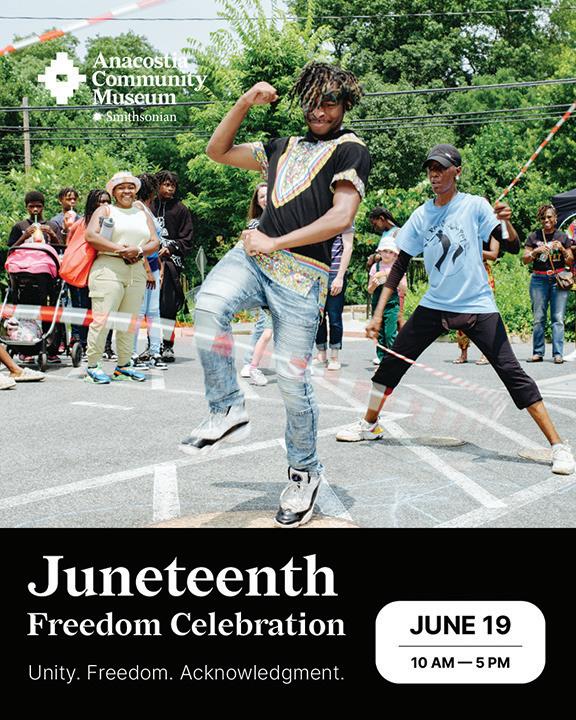
On June 19, the Anacostia Community Center will host a Juneteenth Community Day Celebration,
musical performances and fun for all ages.
Juneteenth Free Community Day
There’s always a good time to stop and smell the roses at the free community day event hosted at the Lewis Ginter Botanical Garden. There will be food sold at the Garden Cafe which has a variety of meals and will be open from 10 a.m - 4 p.m and the patio and grill will open from 5 p.m. - 7 p.m. The garden prohibits visitors from bringing sports gear, outside food and tobacco products. Don’t forget to dress comfortably and to stay hydrated throughout the day.
Date: June 19
Time: 9 a.m. - 9 p.m.
Location: Lewis Ginter Botanical Garden 1800 Lakeside Avenue Henrico, VA 23228
Cost: Free
Juneteenth Freedom Festival
This event is perfect for the whole family with something for everyone through informational presentations, and musical performances by singer and songwriter Roberta Lea, Tank and the Bangas, and the Mosaic Steel Orchestra. There will be food trucks available. The event will be outside, make sure to wear comfortable clothing and remember to stay hydrated.
Date: June 22
Time: 12 p.m. - 5 p.m.
Location: Victory Landing Park 50 26th Street Newport News, VA 23607
Cost: Free
Juneteenth Celebration
The Carlyle House mansion will host a Juneteenth event with vendors, interactive activities, and poetic readings outside on the lawn.
Date: June 19
Time: 6 p.m. - 8 p.m
Location: Carlyle House Historic Park 121 North Fairfax Street Alexandria, VA 22314
Cost: Free
Fifth Annual Juneteenth Community Celebration
The Elkton Community center is hosting its fifth annual Juneteenth celebration and everyone is welcome to join the festivities. The keynote speaker will be Dr. Tony Allen, president of Delaware State University. The Restored Praise and Worship Ministry Gospel Choir from Restoration Tabernacle Church will perform. The day will also include numerous on site health screenings.
Date: June 19
Time: 10:30 a.m.- 2:30 p.m.
Location: Elkton Community Center 121 Stockton Street Elkton MD, 21921
Cost: Free
Songs of Freedom; Journey Along the Underground Railroad Come learn about the life and times of Harriet Tubman through music and story-telling with Linda Harris, the director of events and programming at the Harriet Tubman Museum and educational center in Cambridge Maryland.
Date: June 20
Time: 7 p.m - 8:30 p.m.
Location: Carroll Baldwin Hall 9035 Baltimore Street Savage, MD 20763
Cost: Free
Concert in the Park: Juneteenth
Don’t forget to bring a cozy blanket and your favorite lawn chair and come celebrate Juenteenth with a live musical performance by the Eclipse International Band. Refreshments will be sold.
Date: June 21
Time: 6 p.m. - 8 p.m.
Location: Edmonston Recreation Center 5100 Tanglewood Drive Edmonston, MD 20781
Cost: Free
Summer Jam Series: Juneteenth Celebration
The Hyattsville Summer Jam will be hosting a celebration to honor the day with family and friends. There will be food vendors, live performances and activities for the whole family to enjoy.
Date: June 21
Time: 5:30 p.m - 8:30 p.m.
Location: Hyatt Park 3500 Hamilton Street Hyattsville MD, 20782
Cost: Free

AARP celebrates artists over 50 of every form. Through our Brain Health work, we know that art keeps us mentally sharp, as it connects us and preserves our collective story. Weʼre uplifting these dynamic artists who have mastered their craft in the areas of costume design, dance and hip-hop music.




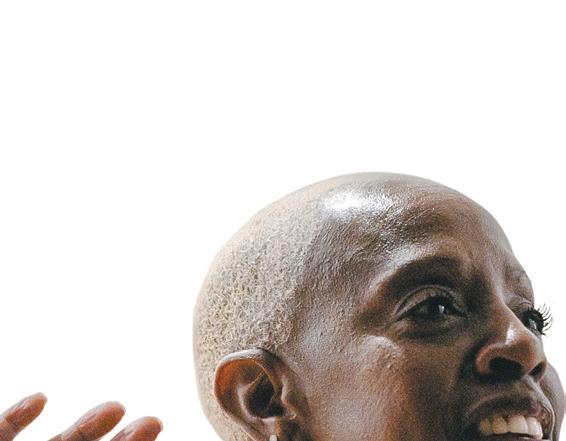










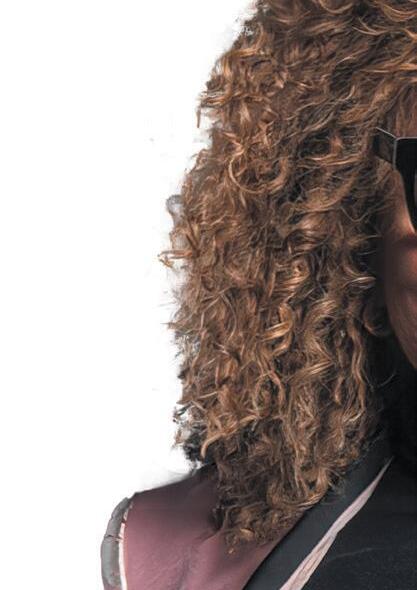








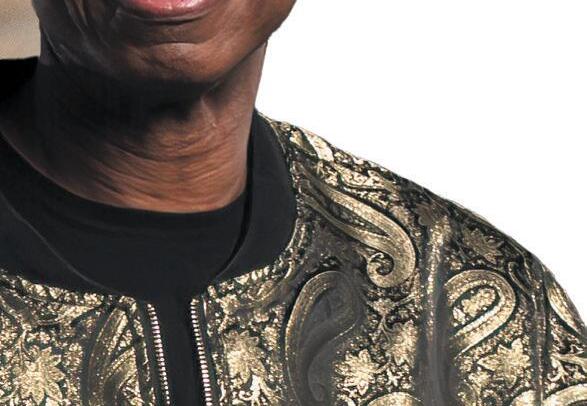



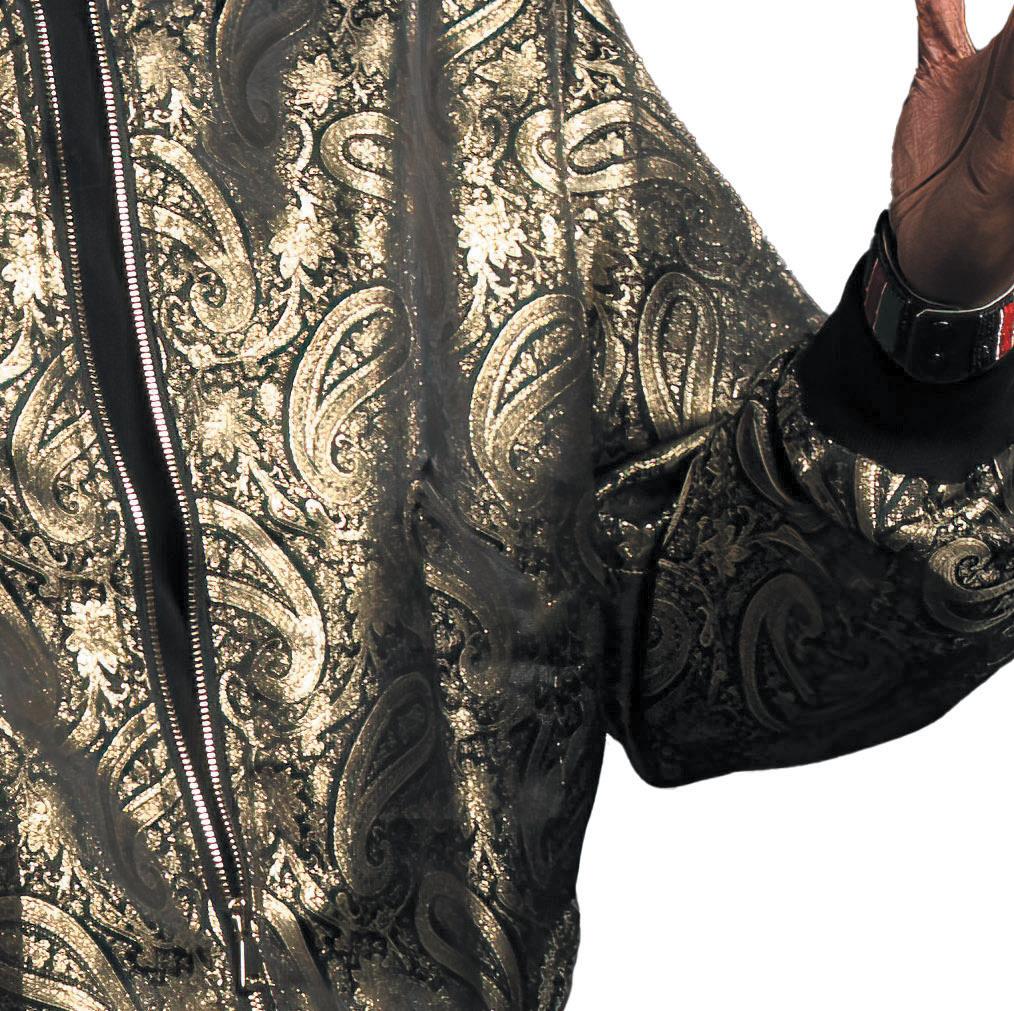












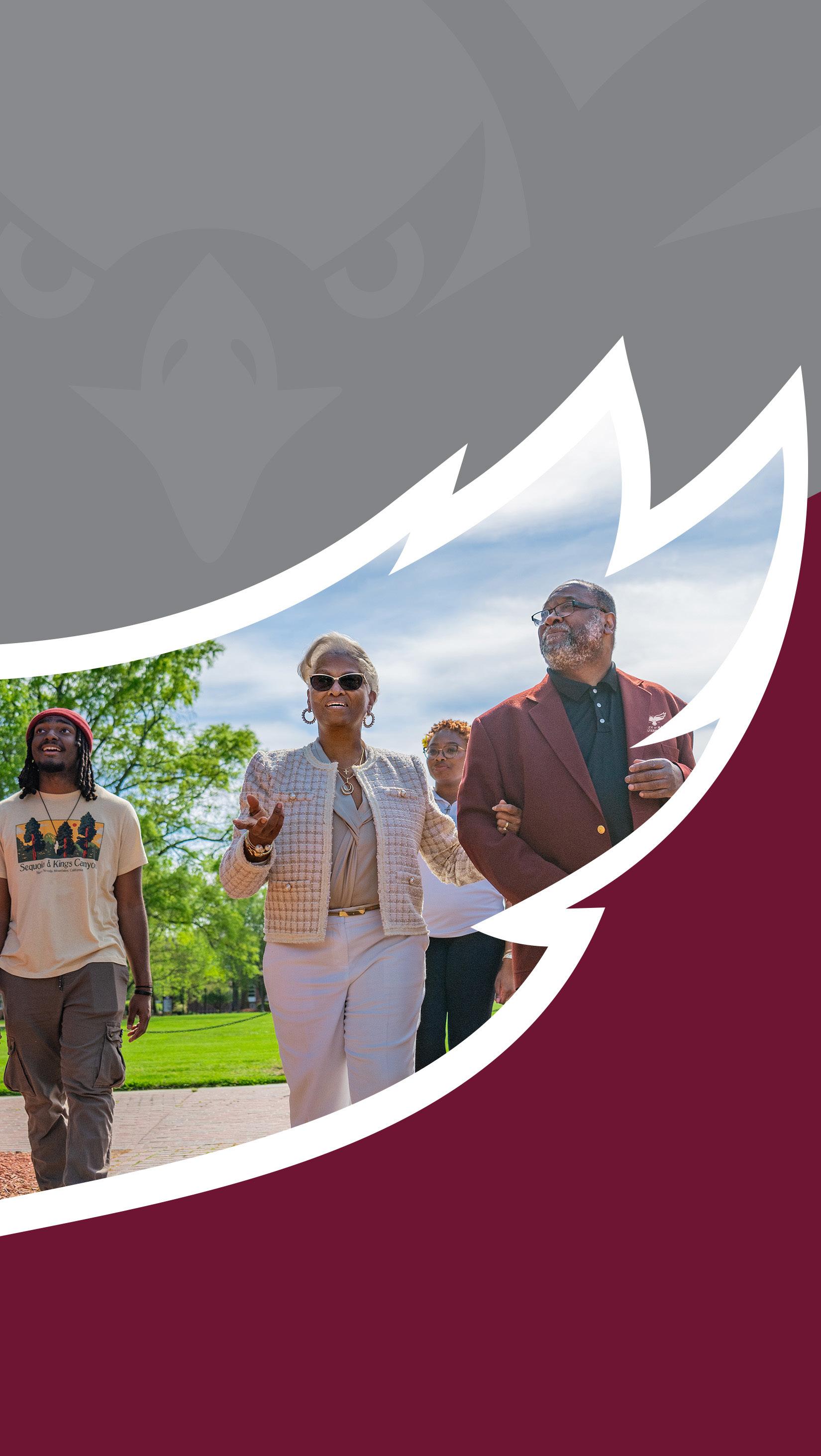

From cookouts to parades and festivals, there are all kinds of festivities that happen every year to commemorate the special occasion of Juneteenth. And as much as the Black community loves to commune and “put a little something on the grill,” the question of how to properly honor the ancestors remains.
This week, the AFRO asked, “What did the first Juneteenth celebrations look like?”
Martha Whiting-Goddard, a historian in the Houston area with personal ties to the origins of Juneteenth, weighed in on how the ancestors celebrated their freedom and how we can pay homage to them as we continue to honor the legacy of Emancipation Day.
“They would organize a parade downtown near where they originally came in on the banks of the bayou and then they would march over to Bagby Street,” said WhitingGoddard. “They had parades for two days. They would dress up and they always had a band. They had a grand marshal and all these things that they’d see people have at a parade.”
“And they would have a speaker and they would always read the Emancipation Proclamation, and General Order No.3 because they
wanted the people to know that these were [the documents that] made them free.”
Whiting-Goddard is the great-granddaughter of John Henry “Jack” Yates, the founding father of Juneteenth. Yates was a freedman who moved to Texas from Virginia. At the time, he was following his family– a group of his most dearly beloved, who had been relocated as his wife’s master tried to escape the Civil War. The Yates family stayed on the master’s new farm in Matagorda County, Texas until the war ended two years later.
Yates knew that Matagorda County was an area with limited opportunity for work, so he traveled to Houston where he earned a living as a drayman, while also preaching the gospel on weekends.
Yates would go on to become a prominent figure in the Houston area, known for the founding of the city’s first African American Baptist church: Antioch Baptist Church. Following the Civil War, and the signing of General Order No.3, many of Yates’ family members came to Houston–and they brought the tradition of celebration with them.
The Yates family began to celebrate their freedom on Juneteenth and on New Year’s Eve, the date that many slaves, further East, sat up all night waiting for the Emancipation

Proclamation to take effect on Jan. 1, 1863.
“No matter what, once they reached the end of the year around when they
“Not only can we come and celebrate Juneteenth, we need to use it as an opportunity to teach our children and future generations about what we had to go through to reach where we are today.”
signed the Emancipation Proclamation on Dec. 31 of 1862, they would always have some sort of celebration because they considered that day very important to them,”
Whiting-Goddard told the AFRO. “Once they knew they had June 19,1865 as well,
they would celebrate both of these events.They’d have a watch night and celebrate the Emancipation Proclamation and they had Juneteenth. They would celebrate both the Emancipation Proclamation and General Order No.3 that General Granger signed on June 19, 1865.”
The Houston historian further elaborated on what kind of festivities took place during the first years of Juneteenth’s establishment, noting that many of the traditions we partake in today were created then.
“When they finished [the reading] they’d have some games that they could play. And they might have some dancing, but it was family fun.They’d always have barbecue and red punch.”
While the block parties and parades are fun, the only way members of the Black community can keep the legacy of Juneteenth alive and well is through education. WhitingGoddard emphasized how important it is that we share the story of Juneteenth and all that the Black community has gone through to not only receive but maintain our freedom with our youth so they can send it on.
“Not only can we come and celebrate Juneteenth but we need to use it as an opportunity to teach our children and future generations about what we had to go through to reach where we are today.”


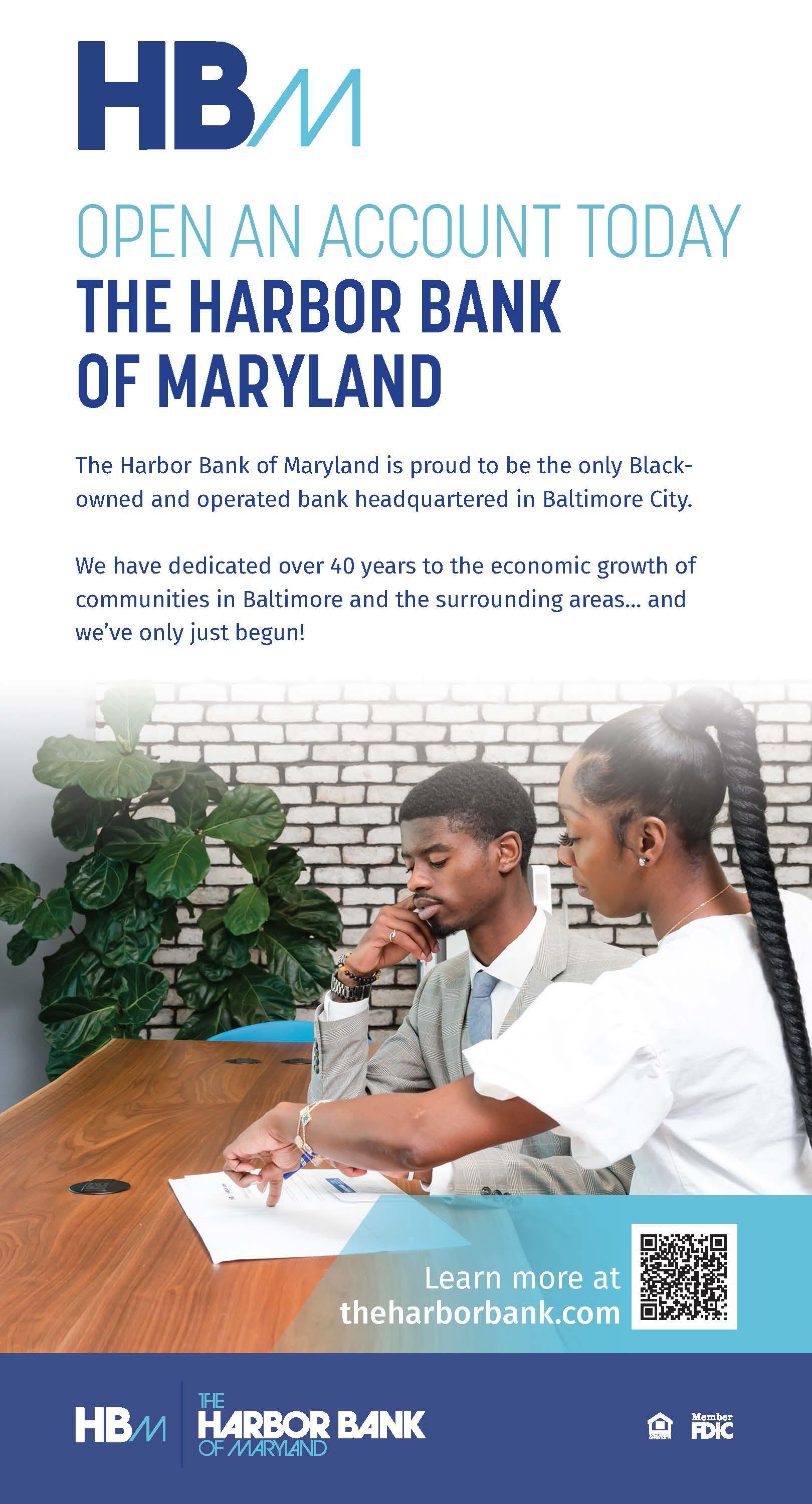
Sponsored Content
Joyce J. Scott: Walk a Mile in My Dreams features nearly 140 works from the 1970s to the present— including sculpture, jewelry, textiles, artwear garments, performance compilations, prints, mixed-media installations, and a new large-scale commission. The astonishing virtuosity and ingenuity of Scott’s work in every medium seamlessly coalesces with her lifelong vision to confront racism, sexism, classism, and “all the ‘isms’ society offers” through impish and audacious humor, expressions of beauty, and a humanistic engagement with global events. Her innate ability to move across medium and genre, leveraging her materials to speak fearlessly to subjects of deep personal and communal meaning make her one of the most significant artists of our time and deserving of greater scholarly study and public recognition.
“Joyce J. Scott is a living legend and a pillar of Baltimore’s
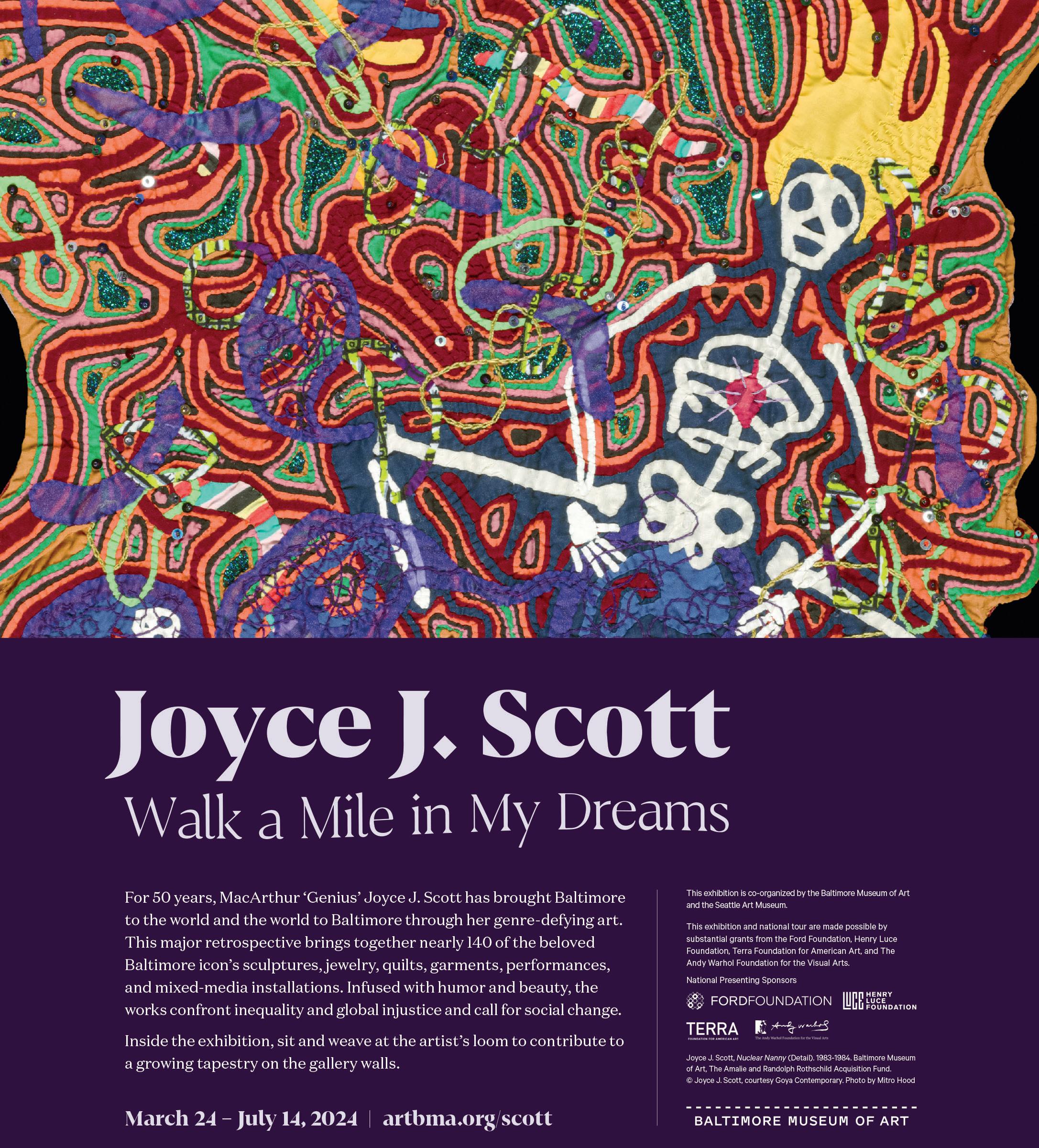
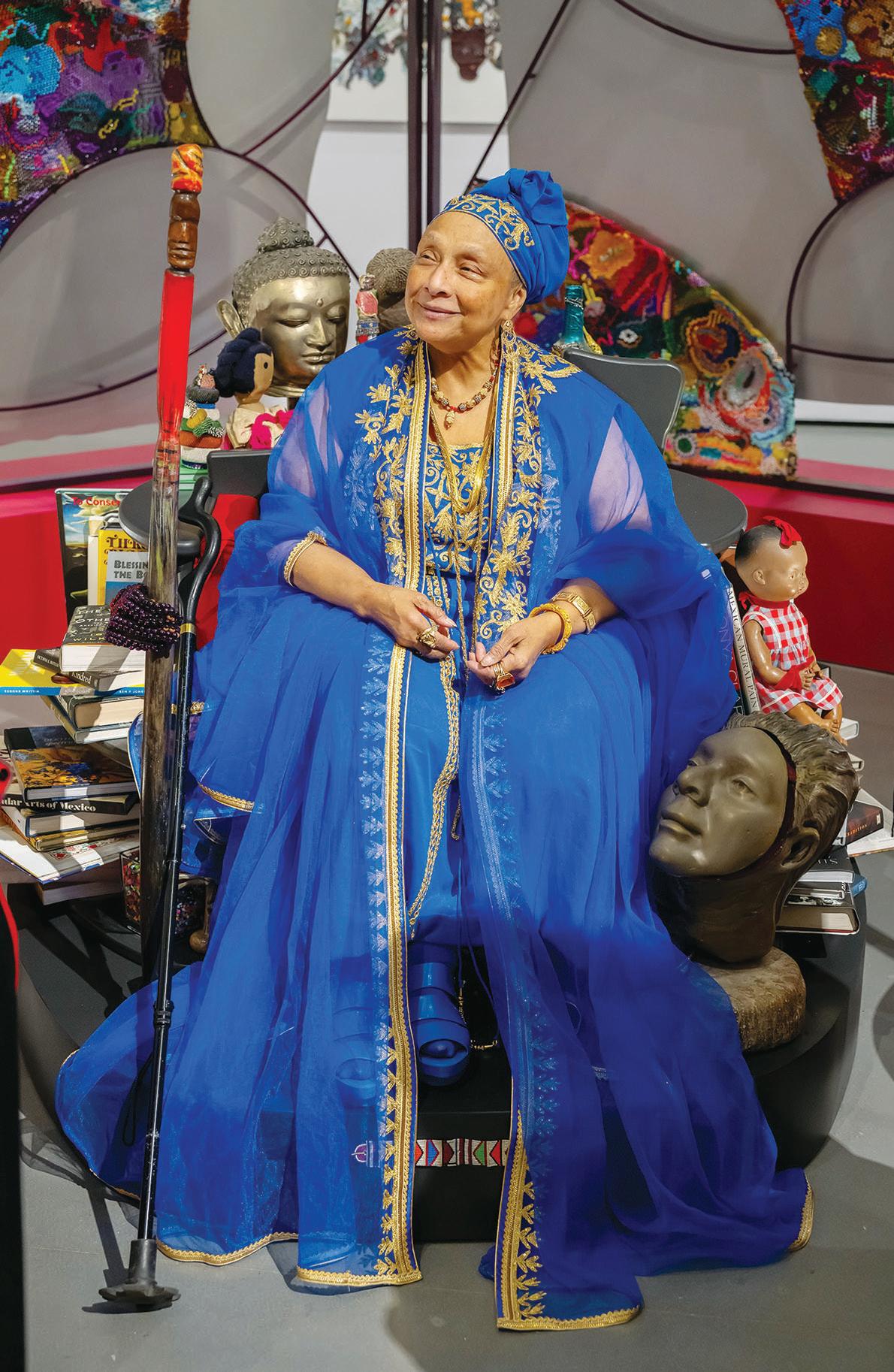
artistic community. Her multidisciplinary practice is in a word, magnetic, distinguished in its ability to conjure moments of beauty and awe, while also bringing people into conversation about challenging subjects in a way that is open and embracing. Her work is deeply rooted in both local and global contexts, vibrating with a resonance that is utterly and uniquely Joyce,” said Asma Naeem, the BMA’s Dorothy Wagner Wallis Director. “The BMA has had the honor of engaging audiences with Scott’s work for many years through exhibitions, public programs, and acquisitions. We are thrilled now to present this comprehensive exhibition that highlights the remarkable range of her career.”
Scott has embraced her identity as an artist and performer since childhood. At home in Baltimore, her mother, the artist Elizabeth Talford Scott (1916–2011) taught her to sew and express herself creatively. Scott considers this knowledge her inheritance: both the specific techniques and
aesthetic traditions carried by enslaved people from Africa to the Americas and the awareness of her own life’s potential as part of a continuum. In the 1970s, Scott began what would become a lifelong commitment to artistic learning and engagement with global cultures. Her extensive travels have taken her to many countries, including Mexico, Cuba, Peru, Mali, Senegal, Scotland, South Africa, Thailand, and Italy, where she connected with local artisans and community members through a shared embrace of textiles, beads, and glass. As a result, Scott’s work has responded to global events—from the AIDS crisis to South African Apartheid and to American police brutality—and served to memorialize personal and collective transformations and traumas.
Tickets $15 for adults, $13 for seniors, $12 for groups of 7 or more, $5 for students with ID, and $5 for youth ages 7-18. BMA Members, children ages 6 and under, and student groups are admitted free.


Baltimore’s St. James Episcopal Church celebrated 200 years in existence on June 7 from 6 p.m. to 8 p.m. The event took place at Martin’s West in Baltimore County and included guests like Rev. Sandye A. Wilson, Ed.D and Sen. Raphael Warnock (D-Ga.). Harold Frazier, a 100-year-old World War II veteran, and former Mayor of Baltimore Kurt Schmore were also among those who attended the celebration. The event was a major milestone for the Black community nationwide. William Levington, the founder of St. James, is believed to be the first Black ordained priest of any church in the south. St. James was the first consecrated Episcopal Church with an African-American congregation below the Mason-Dixon Line. St. James has played an important role in Baltimore history, proving to have an impact on the lives of notable names such as Supreme Court Justice Thurgood Marshall and civil rights activist Clarence Mitchell. The celebration included music by Bliss the Violinist, a solo by Desiree Dawson and a display of “The Sampler,” an 18th century
created by Levington that is now owned by the Colonial Williamsburg Foundation.
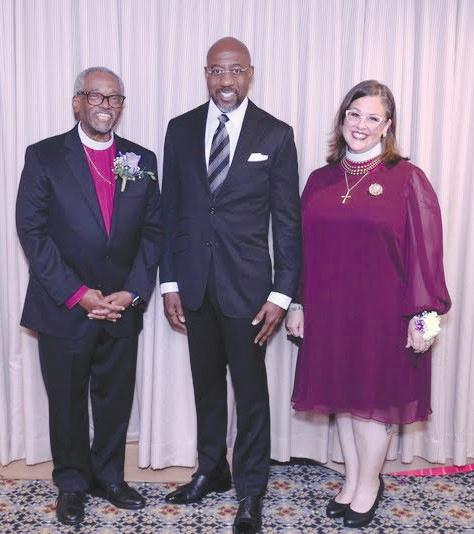
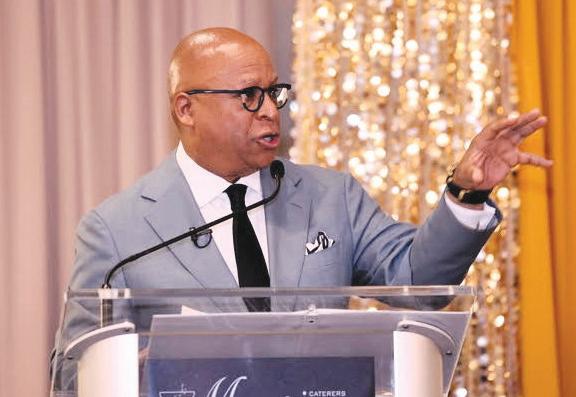
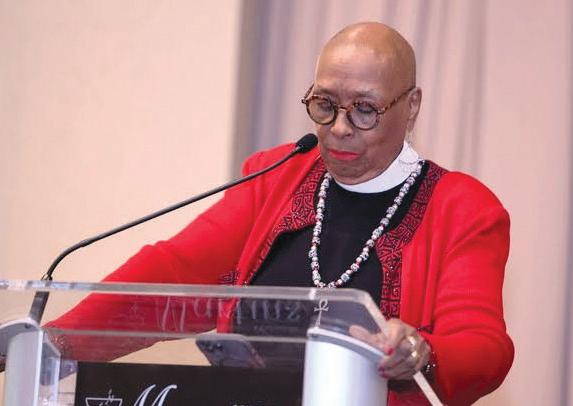

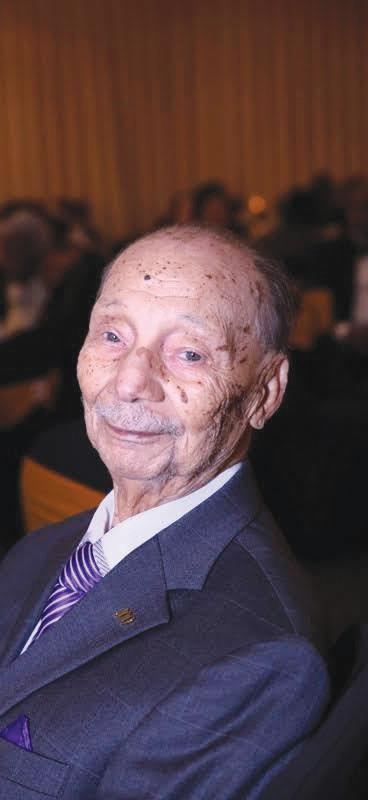


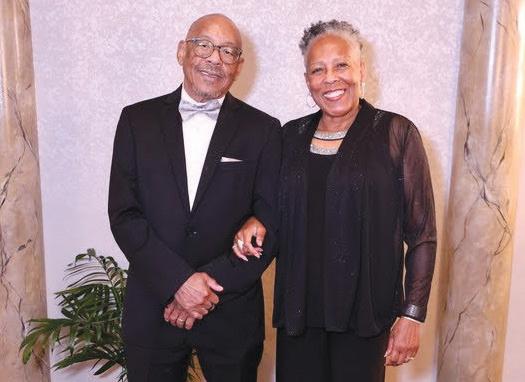



My ancestors were countrymen to a foreign land
Worked and tilled fields
That bore no fruit worthy of their labor
Anchored to a peculiar institution
Excluded from the constitution
Planted in a place that is un-home
My roots grow deep and thick
Wide as my bloodline stretches across the Atlantic
And as vast as the depth it contains
We speak their names
We honor their humanity
We hold space for collective grief
We offer visibility for those denied liberty
They too are American history
Drenched in the blood of my kin
Soaked in the radiance of my skin
My roots dig for the Igbo
Hidden from my tongue for centuries
It grips my genetic memory
As the ancestors reach out to me
These broken roots still grew
Still produced lineage and legacy
Give me a name
Oiled with the fragrance of my authentic self
Oscillating to a rhythm only my DNA recalls
Do not greet me with a manacled moniker
Mention my father in the dignity of his liberation
An identity uncontaminated by erasure
See me here and speak me human
Touch these remnants and feel my soul
Etch my name in history and personhood
Remember us free

my mother was born on independence day so on the 4th morning of the 7th month, we gather decorate our home in red, white, and blue the colors - an inherited tradition rather than a celebratory attitude like most we barbecue and when the sun sets in the sky we make our way to a lookout spot to watch fireworks light up the night
but…
we have never associated our freedom with the american revolution we have always understood that the declaration of independence was written for people who don’t look like us so we dance at the cookout but always to the beat of a different drum one that beats nearly 90 years after that of jefferson sure…the star spangled banner is a beautiful song but something resonate happens when lift every voice (and sing) comes on
my people had to wait many years to hear that a fraction of their freedom was finally near that was june 19th, 1865 to be exact but my history books didn’t teach me that my teachers never mentioned this fact instinctively, though, i happened to know that change can be slow and the world can be masterful in the delay of its own growth history is often buried deep behind the comfortable stories of triumph and hope but juneteenth… the day that general gordon granger rode into texas to announce a few things 90 years after europeans celebrated freedom from their king the juneteenth proclamation decreed “absolute equality between former masters” and the enslaved it told black people to “remain quietly at their present home and to work for a wage” the declaration that set black people free told them not to expect assistance for their unfortunate state so yeah… we celebrate juneteenth sets the stage paves the way for the long path to equality it is the separate and necessary truth about american history
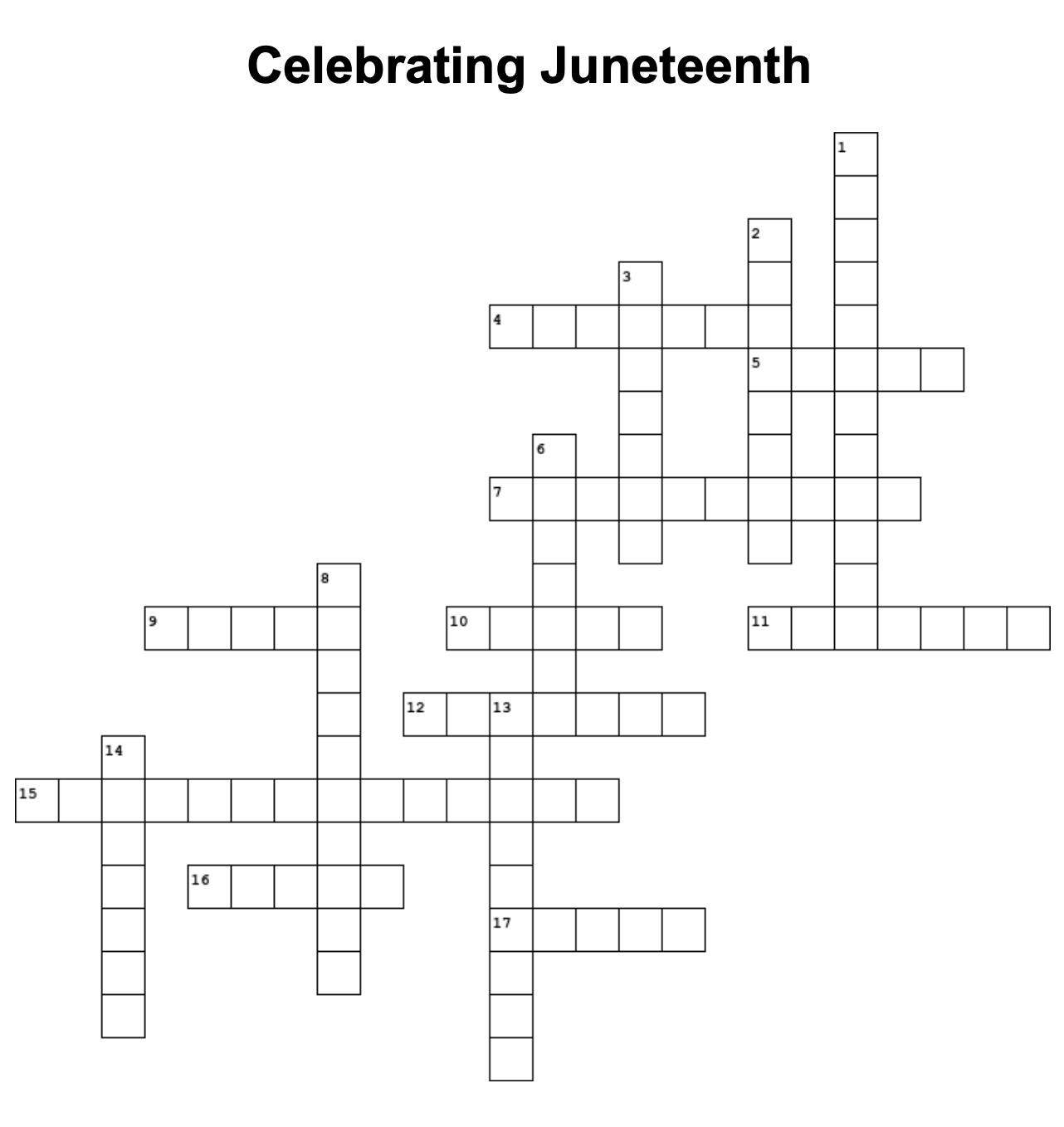

and its fractured democracy a more accurate day to celebrate independence for nearly 14 percent of this country for my family 7/4 is a birthday celebration for others is it about american independence and the birth of a new nation but there is still racism and subjugation barriers still exist so we come more equipped we stand on the shoulders of warrior men and women we show up with harriet tubman’s courage and king’s vision maya angelou’s wisdom obama’s class and charisma the stamina of fannie lou hamer and opal lee …this holiday’s curator our ancestors ran the race now we keep a steady pace with our necks forever bent towards equality we show up everyday and in every way …without apology



Menopause. It’s such a defining period in an adult woman’s life, yet little is communicated or discussed about it outside of the doctor’s office.
Even the definition of menopause is often misconstrued.
“Menopause means the cessation of menstruation for 12 months with no other identifiable cause,” Kimberly Kesler O’Rourke, MD, board-certified OB-GYN with GBMC Health Partners Perinatal Associates, said. “A lot of the problems or symptoms you hear about are actually perimenopause—getting irregular periods, hot flashes, mood swings—but menstruation hasn’t technically ceased yet. Some people go 12 months with no period and it’s not technically menopause for other various medical reasons.”
Menopause is one day, 12 months following your last period. On average in the United States, women are 51 when this occurs, but it can happen anywhere between 45-60 years of age, and the symptoms, such as the ones Dr. Kesler O’Rourke described, can begin much earlier. If menstruation ceases before 45 years of age, it would be considered premature ovarian failure.
“At that point, we would definitely want to look for a root cause and potentially treat with hormones as there are increased risks of low estrogen when starting that young,” Dr. Kesler O’Rourke said.
In the first 12 months to two years after menstruation stops, ovaries are still producing some hormones, just not enough to release an egg. This stage—when
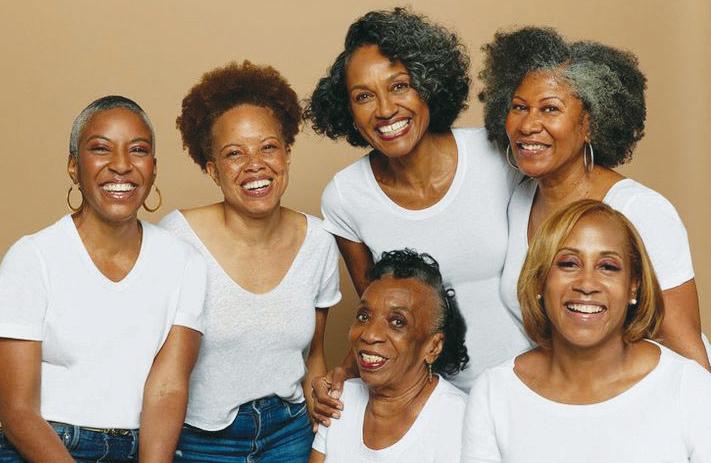
hormones are still present, just not as much as usual—is when women begin to feel most symptomatic.
When the brain senses less estrogen, it increases the Follicle-Stimulating Hormone (FSH) to stimulate the ovaries to make more. The ovaries respond by making more estrogen and then the FSH decreases. But the ovaries don’t have much left, so it goes back down quickly.
This rapid back and forth between the ovaries and FSH is what causes symptoms. Dr. Kesler O’Rourke compares it to a fireworks show.
“When you first get your period in puberty, your hormones are very high. It’s the very beginning and you’re very
symptomatic. You get PMS, bad periods, and then you even out,” she said. “When there are fewer eggs left, they are making less hormone. Once you get through that menopausal transition and the hormones are just low and stable, most people feel okay.”
Hormonal levels can vary significantly within just an hour, making it challenging to rely on them as indicators for diagnosing menopause or determining the appropriate hormone replacement dosage. However, OB-GYNs can test for FSH and estradiol levels to identify unusual cases, such as women who experience perimenopausal symptoms before the age of 45.
Dr. Kesler O’Rourke recommends
preparing your body as early as possible for this change, including a healthy lifestyle of eating clean and exercising regularly, specifically lifting weights to maintain muscle mass that can often be lost along with estrogen levels.
“Without resistance training, women
“... preparing your body as early as possible for this change, including a healthy lifestyle of eating clean and exercising regularly, specifically lifting weights to maintain muscle mass that can often be lost along with estrogen levels.”
begin to lose muscle mass in our 30s, and the metabolism goes with it. This really hits hard when menopause occurs,” she said. “When you’re in your forties, take advantage of those hormones still being around and stimulate your muscle mass so your body is ready for the change in hormone levels. The earlier, the better!”
Talk to your doctor about your unique history and get help navigating symptoms today.


On June 19, 1863, the Emancipation Proclamation declared the abolition of slavery in Confederate states that had seceded from the Union during the Civil War. Taking over two years for the news to spread, on June 19, 1865, the slaves of Texas were freed. By the end of the year, the 13th Amendment to the Constitution provided freedom to slaves across the country, in what had been both Union and Confederate territories during the Civil War.
Raven Kay Stringfield, Ph.D., a full-time author on the topic of
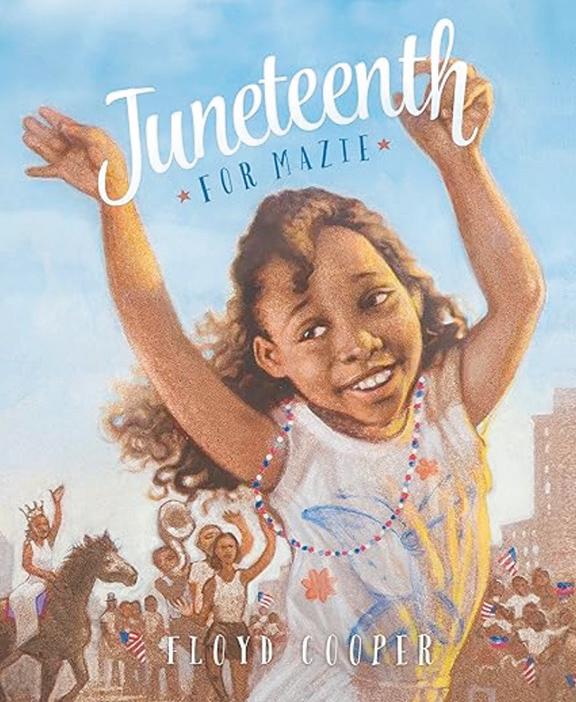
American studies, says this Juneteenth is the perfect time to reevaluate the notion of “freedom,” the road traveled and the path ahead.
“It’s an annual reminder to be constantly thinking about what it means to ‘be free.’ We haven’t gotten there yet. We are still in progress and moving towards it. We are building it every single day and we are in a struggle for it,” said Stringfield.
As with most things, education is key. But as more Black books are banned, Black history and Black voices are growing increasingly absent from public school curriculums.
A study from the American Library Association’s Office for Intellectual Freedom (OIF) documented the largest number of banned book cases in 2023. Last year, OIF reported over 4,000 book bans in schools and libraries. Black and Indigenous authors, along with other people of color, create 47 percent of the books banned.
This week, the AFRO compiled a book list informing young readers from K-12 about Juneteenth and its importance. Check the list out below.
Juneteenth for Mazie
(January 2015)
Written and illustrated by Floyd Cooper
“Juneteenth For Mazie” was written and illustrated by Floyd Cooper. The AFRO chose this book because it put young readers in Mazie’s shoes as she learns about Juneteenth and how African Americans gained their freedom.
Opal Lee and What It Means to Be Free: The True Story of the Grandmother of Juneteenth (January 2022)
Written by Alice Faye Duncan
Illustrated by Keturah A. Bobo
“Opal Lee and What It Means to Be Free: The True Story of the Grandmother of Juneteenth,”was written by Alice Faye Duncan and illustrated by Ketirah A. Bobo. The book tells the story of Opal Lee, a Black activist known as “The Grandmother of Juneteenth.” In this book, Lee educates readers on the history behind Juneteenth while also telling the story of what inequity looked like during her childhood. There is also a special surprise at the end of this book! Make sure you read all the way through!




Get Up, Stand Up
(September 2019)
Based on the song by Bob Marley
Adapted by Cedella Marley
Illustrated by John Jay Cabuay
Jamaican singer, songwriter, children’s author and daughter of the legendary artist Bob Marley, Cedella Marley, has adapted her father’s song “Get Up, Stand Up.” This book teaches children to stand up for social injustice and to lift each other.

Juneteenth A Novel (May 1999)
Written by Ralph Ellison R. JohnsonAdopted by Charles

Author Ralph Ellison began writing his book,“Juneteenth A Novel,” in the 1950s and was still writing it when he passed away in the 1990s. The book is a combination of dialogue and lyrical writing and was adapted by Charles R. Johnson in 1999. Readers will enjoy the story, which features a Washington, D.C. senator and minister as he commemorates Juneteenth.
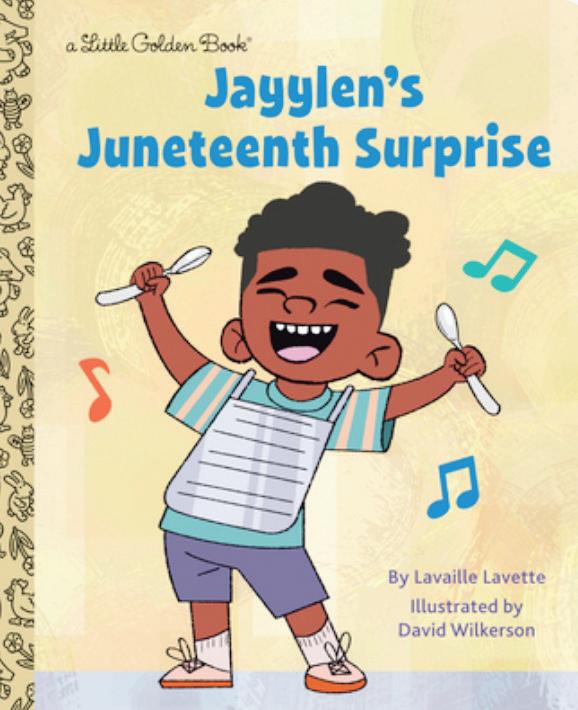
The Juneteenth Cookbook: Recipes and Activities for Kids and Families to Celebrate (April 2024)
Written by Alliah L Agostini and Taffy Elrod
Illustrated by Sawyer Cloud
This cookbook emphasizes the significance of the red food commonly served on Juneteenth. Representing the bloodshed of African-American ancestors, recipes include red lemonade, potato salad and barbeque chicken. The book also includes activities to celebrate the holiday including field trips, crafts and more!
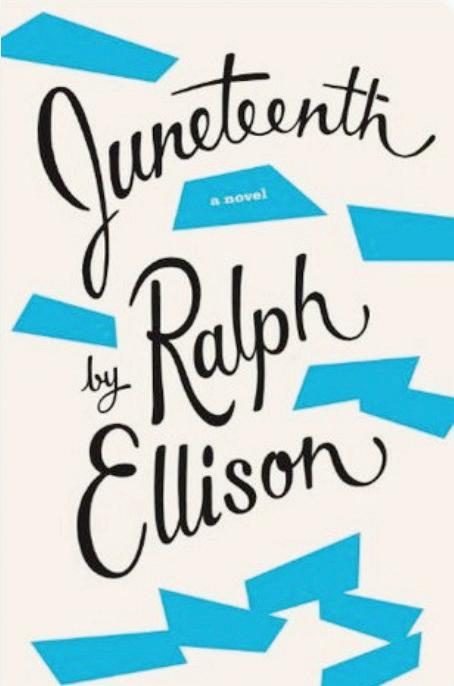

Envisioning Emancipation: Black Americans And The End Of Slavery (December 2012)
Written by Deborah Willis and Barbara Krauthamer In this offering by photographic historian Deborah Willis, photos of Juneteenth celebrations, AfricanAmerican soldiers, Black families and more depict what life was like for African Americans in the post-slavery era.



Each year millions of people throughout the country celebrate Juneteenth. The holiday, made official in 2021, is the perfect time to uphold sacred traditions and give thanks to the ancestors who have paved the way.
In a day and age where history is being rewritten and retold it’s important now, more than ever, to uphold traditions of the Black community.
Dr. Clinton Bolton, a respected psychologist, believes upholding tradition can give way a strong sense of ancestral connection and belonging.
“Honoring tradition allows individuals to reflect on the progress made and the ongoing fight for equality, fostering a profound connection to their ancestry and boosting self-esteem,” said Bolton. “It also has the ability to heal generations from the epigenetic trauma of slavery.”
Whether it’s reading Black literature, attending a cookout or learning
“Upholding traditions for Juneteenth offers significant psychological benefits by fostering a sense of identity, community and continuity, deeply rooted in the Black experience.”
something new about Black history– members of the Black community have a

variety of options when it comes to grounding oneself in the pride and identity that accompanies many Black traditions.
As the Black community has faced– and continues to face– generational trauma and family displacement, honoring Black triumphs in time on an annual basis can help preserve the rich heritage of African

Americans and their holidays, like Juneteenth and Kwanzaa.
The calls to bring back certain Black traditions from the old days, such as eating together, supporting the work of griots who pass down stories, drum circles, attending homecomings at a hometown church, quilting or simply spending time with elders is growing louder.
community rituals can go a long way in “preserving the memory of past struggles and triumphs, such as the emancipation of enslaved African Americans in 1865.”
“This is crucial for resilience and empowerment,” he added. “It highlights the endurance and strength of the Black community.”
Psychiatric nurse Robyn Manning agrees, saying in an AFRO interview that Juneteenth marries the ideas of identity and empowerment.
“Understanding where we come from is empowering,” said Manning. “Without having a sense of identity, it really is hard to stand on anything.”

Open 6 Days
Closed Tuesday
1732 Thames St. Baltimore gh gh
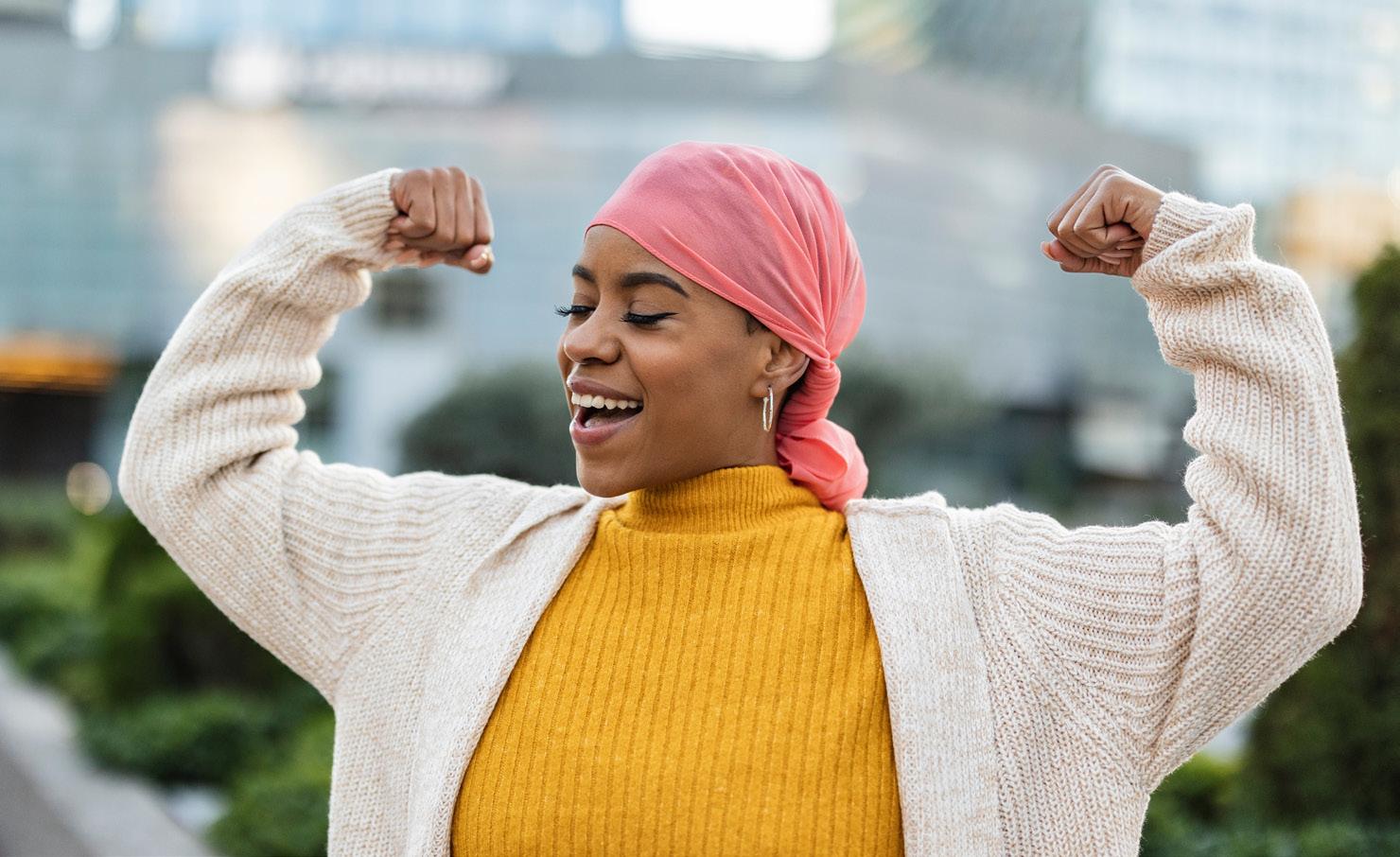
The University of Maryland Medical System is bringing the latest advances in cancer care to Largo.
Our cancer experts diagnose and treat a full range of common and rare cancers in one convenient location with advanced services that include:
• Medical oncology
• Radiation oncology
• Surgical oncology
We understand that each person’s needs are personal and unique. That’s why we’re here with you every step of the way to answer questions, help with appointments and scheduling, and provide emotional support for you and your loved ones
Complete cancer care, close to home.



Juneteenth, a federal holiday recognized in the United States, is the anniversary of when slaves in Texas received word that they had been freed under the Emancipation Proclamation of 1863. In honor of the occasion, the AFRO Intern Team conducted man-on-the-street interviews focused on what Juneteenth means to Maryland residents from all walks of life.
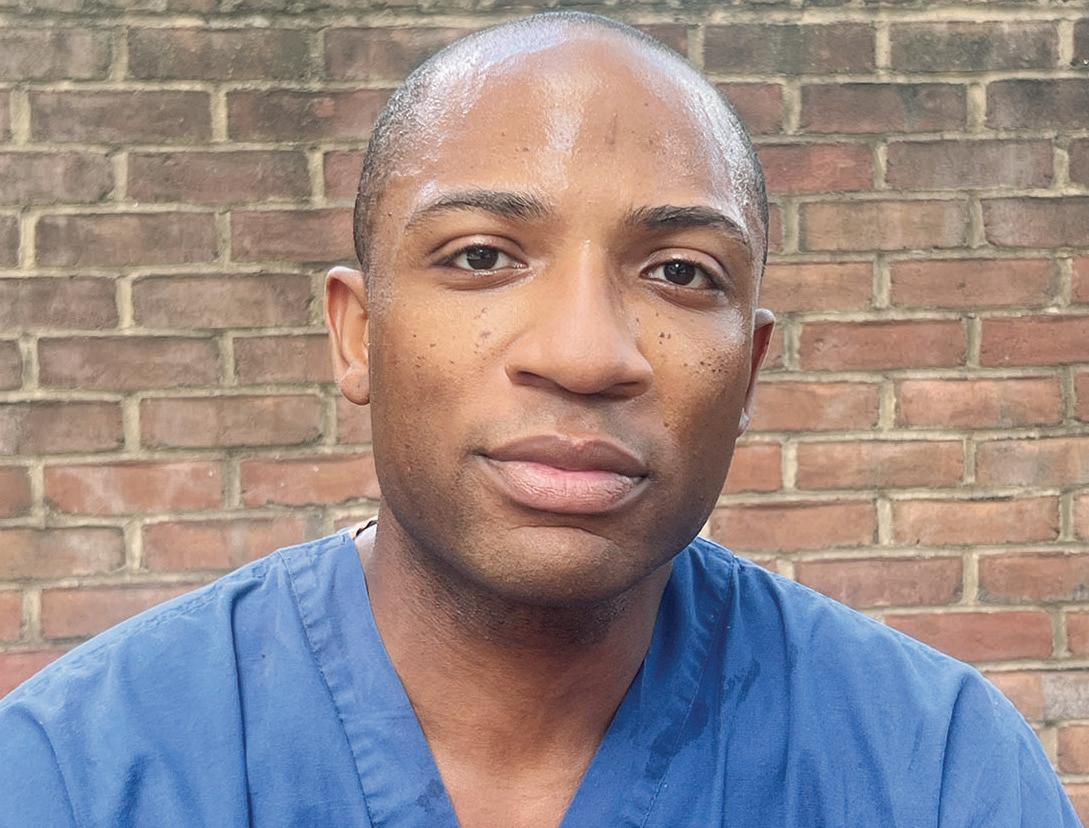
“Juneteenth is a celebration of our liberation. It is the true day that we got our freedom and it’s a celebration of the ability for Black people to ‘do us.’ I think the celebration of Juneteenth is important because remembering history and how you got to where you are is important to know as you work towards where you want to go.”
Oba Minus, 37 Washington, D.C.
Works for University of Maryland, Dept. of Laboratory Animals, Science and Research
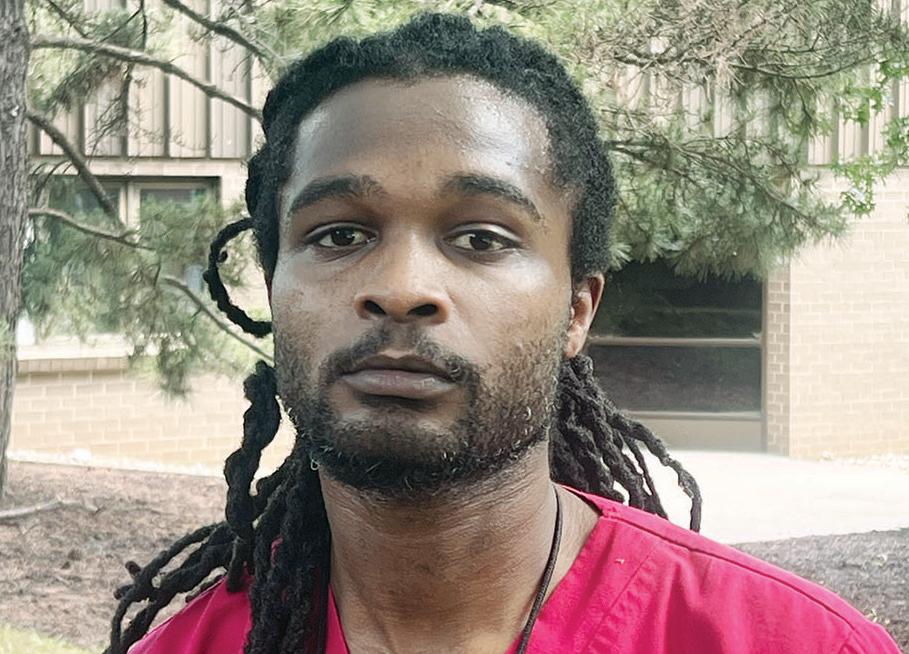
“Juneteenth means celebrating our culture. It’s symbolic of the growth of our community, emancipation and freedom”
Legend Parker, 29 Brooklyn, NY University of Maryland, Dept. of Laboratory Animals, Science and Research
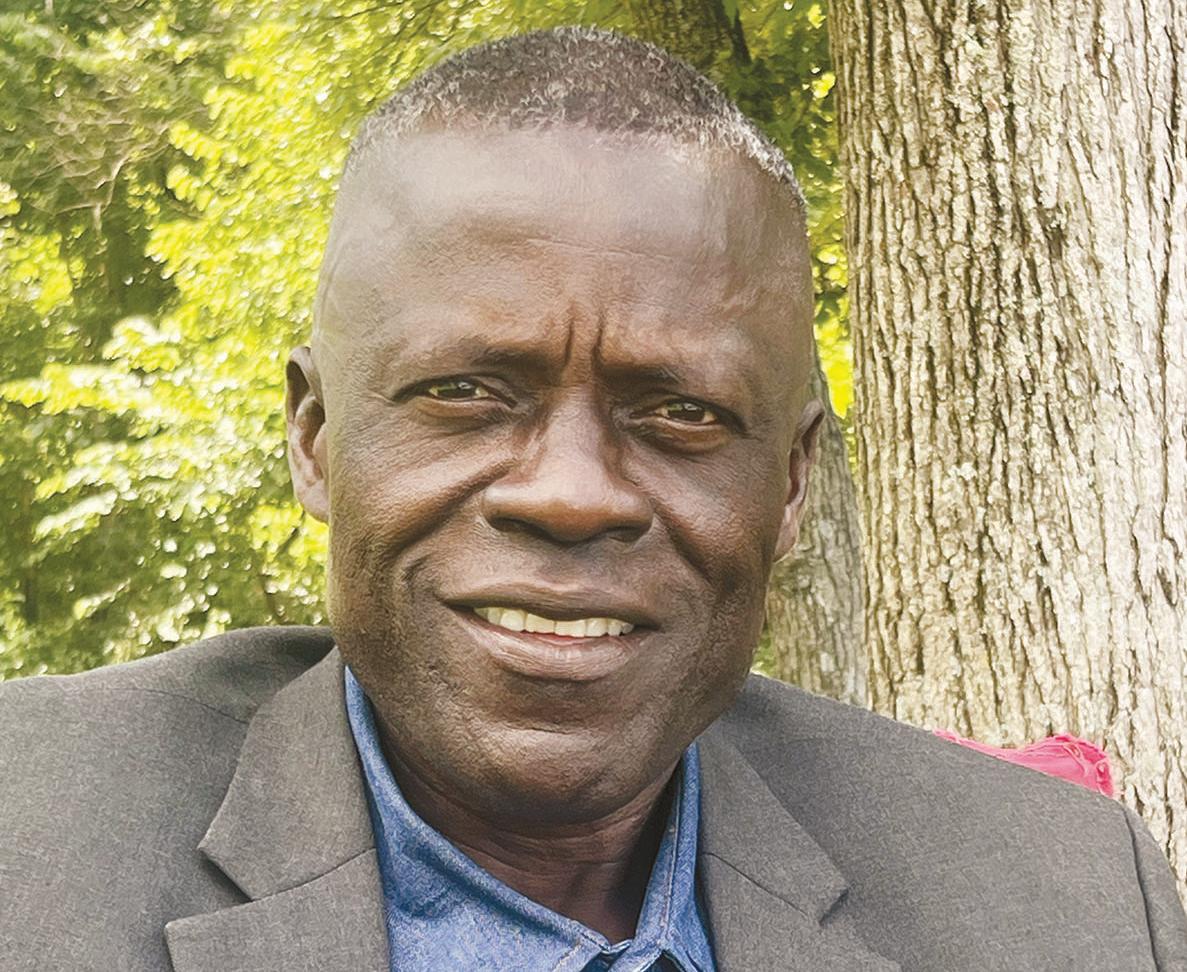
“Juneteenth is a very important piece of AfricanAmerican history. Of course Africans should also participate in the celebration of Juneteenth. It shows that this country has acknowledged the wrong that was done to us as a people.”
Martin Bibum, Ed. D, 63 From Ambazionia (formerly British Southern Cameroons) Professor
“Juneteenth means celebration. I think I learned about Juneteenth in college because I knew some people from Texas. It’s nice that we picked up something to celebrate our freedom from slavery [from] a national standpoint. It came late, but it came at the right time because everyone is celebrating it and everybody should embrace it.”
“When we have young people in preschool, we should be teaching them so they don’t have to wait until they’re 30 years old to celebrate who they are… free people.”
James Peters Baltimore native Teacher
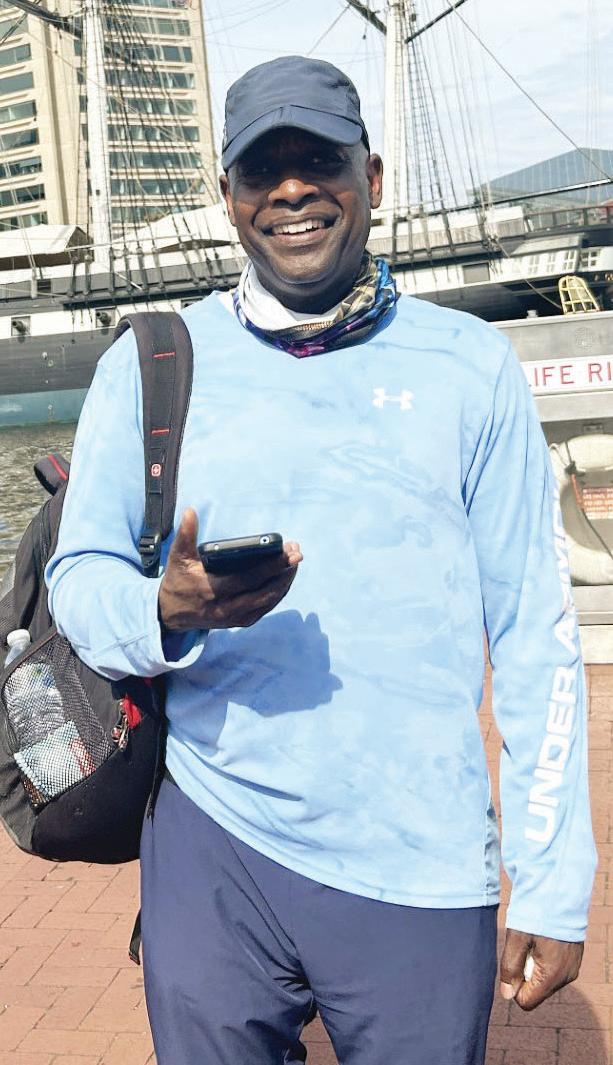
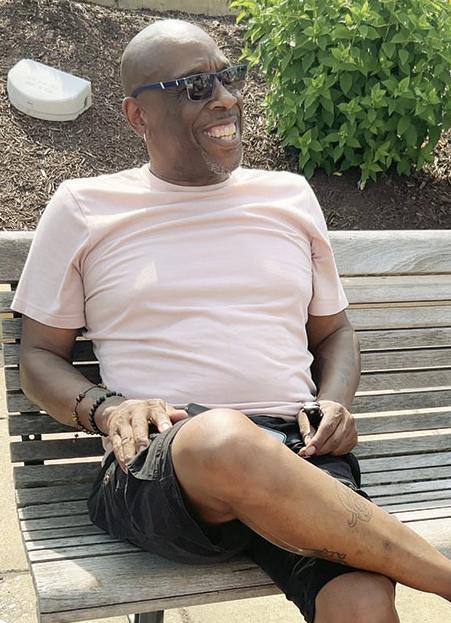
“Don’t forget the past–but don’t get stuck there. Let’s move forward, let’s better things…Everyone knows what happened ‘once upon a time.’ It was bad, it was tragic. We suffered as a people. But it is not as bad today.”
Antoine Askins Maryland Eastern Shore Native Restaurant Manager



A powerful new exhibition is set to open in Baltimore on June 19, offering a multifaceted exploration of Black history, identity and imagination. “Soon Come” explores beyond traditional narratives, foregrounding the enduring strength and creative spirit of Black communities.
Opening on Juneteenth, the exhibition, curated by Sharayna Christmas, executive director of Muse 360, and co-curated by Jordan Carter, Program Manager of Muse 360, goes beyond mere commemoration.
Through a vibrant tapestry of textiles, photography, video, sound, assemblage and poetry, emerging artists from the New Generation Scholars Young Artist Archival Fellowship reclaim lost histories and reimagine a future brimming with possibility.
The fellowship is offered by Muse 360, a Baltimore-based youth organization with a radical mission. Since 2004, Muse 360 has been dedicated to helping Baltimore’s youth cultivate their voices and artistic talents as a path to self-knowledge. 2024 marks the second year that Afro Charities has partnered with the organization to produce this program.
This year, the program expanded to include young adults aged 18-22, pairing them for the first time with mentors in the fields of art, scholarship, and the archives to guide their artistic journeys. Participants will also receive a stipend for successfully completing the program. During the past six months, the fellowship has deepened their archival and creative practices, empowering them to create new bodies of work that challenge and
inspire their audiences.
“I have been a member of the New Generation Scholars Artist Archival Fellowship since January
explore art from the past and present through archival research.”
For this exhibition, fellow Teylah Saunders created a new textile work entitled “so, what about the heart?” — a woven blanket collaged with images from her family’s archive and embellished with embroidery and beading.
“Woven blankets have such a rich history within the Black community. I love the idea of weaving together narratives into something you can hold and embrace.”
2024,” Daisha McIlwain said. “I’ve been able to grow alongside fellow artists of different mediums and
“Woven blankets have such a rich history within the Black community,” said Saunders. “I love the idea of weaving together narratives into something you can hold and embrace.”
“Soon Come” is not just a display of art, it’s an opportunity

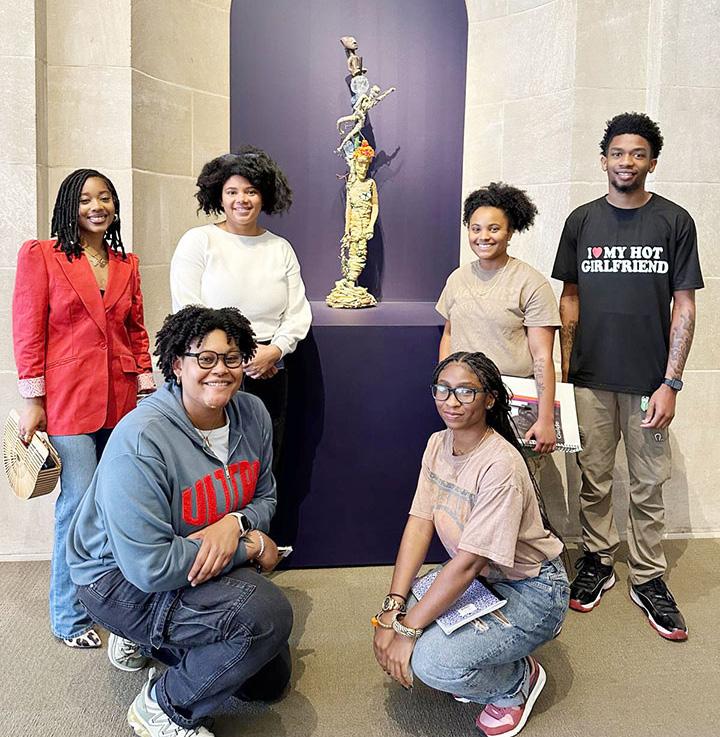
for viewers to confront the past, celebrate revolutionary love, delve into the depths of Black spirituality, and recognize the boundless creativity that has always fueled Black progress. The 2024 Cohort of New Generation Scholars Young Artist Archival Fellows—Breyanna Dabney, Daisha McIllwain, Khalil McFarlane, Lory Charles, Sha-Shonna Rogers, and Teylah Saunders—promise to deliver a moving and thought-provoking exhibition that will deepen your understanding of Black history and culture.
The exhibition debuts at The
360 House, a new intergenerational space that will provide activations for artist residencies, screenings, and will be the home base of Muse 360. RSVP for the opening reception on Wednesday, June 19th, from 5 p.m. to 8 p.m. at: linktr.ee/ngsworld The address will be disclosed upon confirmation of attendance with RSVP.
For more information on the New Generation Scholars Young Artist Archival Fellowship program or to donate to Afro Charities, please visit https://www. afrocharities.org/
The Biden-Harris administration held the second annual Juneteenth concert on the South Lawn of the White House on June 10.
The event started at 7:30 pm and was hosted by comedian Roy Wood Jr., who cracked jokes throughout the night while also emphasizing the importance of celebrating Juneteenth.
The holiday commemorates June 19, 1865, the day that enslaved people in Galveston, Texas found out that they were free through the Emancipation Proclamation signed by President Abraham Lincoln on Jan. 1, 1863.
“This was a celebration of achievements against a backdrop of people who are trying to erase it and make it harder for Black people to have access points. President [Biden] is going against all odds to ensure there’s equity and strength for the Black community.”
President Joe Biden gave a speech during the concert and stated that the June 10 celebration was a “fitting tribute” for the holiday. The president also took a moment to discuss recent attacks launched against diversity and equity programs across the nation.
“Old ghosts in new garments [are] trying to take us back– taking away your freedoms, making it harder

Meta (Facebook) / President Joe Biden Gospel artist Kirk Franklin shares a moment with Vice President Kamala Harris at the second annual Juneteenth concert, hosted on the South Lawn of the White House.
for Black people to vote or have your vote counted,” he added. “Our history is not just about the past, it’s about our present and our future…for all of us.”
In attendance were Congressional members Jasmine Crockett (D-Texas-30), Ayanna Pressley, (D-Mass-7), Cori Bush (D-Mo-1) Maxine Waters, (D-Calif-43) and Steven Horsford, (D-Nev-4), attorney Ben Crump, MSNBC host Symone SandersTownsend and rapper Joey Bada$$.
Pressley stated she attended the Juneteenth concert to pay tribute to Opal Lee, the advocate who pushed for the holiday to become nationally recognized.
“She made this possible and many fought to make this holiday real,” said Pressley. “There are a lot of people who bled, who prayed, who paved the way… for me to be involved everyday in the work of Black liberation.”
Over a two-hour period, guests experienced
performances from Patti LaBelle, Anthony Hamilton, Kirk Franklin, Raheem DeVaughn, Charlie Wilson, Doug E. Fresh, Gladys Knight and many other talented artists.
LaBelle sang her hit song “Love, Need and Want You,” Hamilton sang his classic “Charlene” and Kirk Franklin gave the audience a show while dancing to his song “Love Theory.”
“This was a celebration of achievements against a backdrop of people who are trying to erase it and make it harder for Black people to have access points,” said Cross. “President [Biden] is going against all odds to ensure there’s equity and strength for the Black community.”
In 2021, Biden signed a law that made Juneteenth a federal holiday. This year Juneteenth will be recognized on Wednesday, June 19.
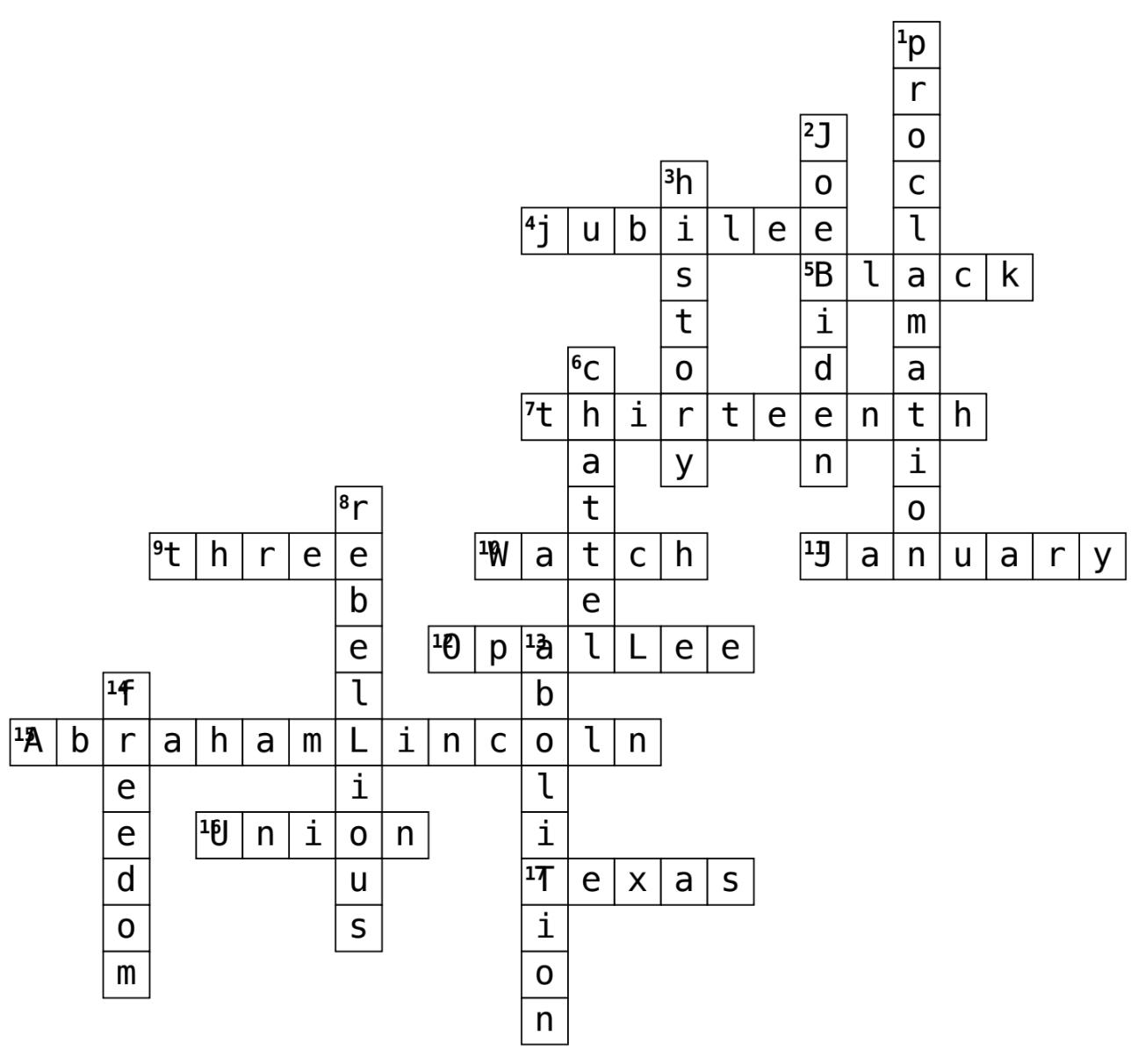

SUPERIOR COURT OF THE DISTRICT OF COLUMBIA PROBATE DIVISION ADMINISTRATION NO. 2024ADM000574
JEANNETTE K. WRIGHT AKA
JEANNETTE KAREN WRIGHT Name of Decedent KARL L.CHEN CHEN LAW, LLC 9701 APOLLO DRIVE SUITE 381 LARGO MARYLAND 20774 Notice of Appointment, Notice to Creditors and Notice to Unknown Heirs MARK HODGE, whose address is 10013 DOLBY AVENUE, GLENN DALE, MD 20769 was appointed Personal Representative of the estate of JEANNETTE K. WRIGHT AKA JEANNETTE KAREN WRIGHT, who died on SEPTEMBER 12, 2021 with a Will and will serve without Court supervision. All unknown heirs and heirs whose whereabouts are unknown shall enter their appearance In this proceeding. Objections to such, appointment shall be filed With the Register of Wills, D.C., Building A, 515 5th Street, N.W., 3rd Floor, Washington, D.C. 20001, on or before DECEMBER 1, 2024. Claims against the decedent shall be presented to the undersigned with a copy to the Register of Wills or filed with the Register of Wills with a copy to the undersigned, on or before DECEMBER 1, 2024 or be forever barred. Persons believed to be heirs or legatees of the decedent who do not receive a copy of this notice by mail within 25 days of its publication shall so inform the Register of Wills, including name, address and relationship.
Date of first publication: MAY 31, 2024 Name of newspaper and/or periodical: Daily Washington Law Reporter AFRO American Newspapers
MARK HODGE Personal Representative TRUE TEST COPY REGISTER OF WILLS 5/31, 6/07, 6/14/24
SUPERIOR COURT OF THE DISTRICT OF COLUMBIA PROBATE DIVISION ADMINISTRATION NO. 2024ADM000594 FLOYD OTIS ATWATER Name of Decedent Notice of Appointment, Notice to Creditors and Notice to Unknown Heirs
D.C. 20001, on or before DECEMBER 1, 2024. Claims against the decedent shall be presented to the undersigned with a copy to the Register of Wills or filed with the Register of Wills with a copy to the undersigned, on or before DECEMBER 1, 2024 or be forever barred. Persons believed to be heirs or legatees of the decedent who do not receive a copy of this notice by mail within 25 days of its publication shall so inform the Register of Wills, including name, address and relationship. Date of first publication: MAY 31, 2024 Name of newspaper and/or periodical: Daily Washington Law Reporter AFRO American Newspapers SHAWN REAVES Personal Representative TRUE TEST COPY REGISTER OF WILLS 5/31, 6/07, 6/14/24
SUPERIOR COURT OF THE DISTRICT OF COLUMBIA
NATALIE J MARTIN BROWN, whose address is 1500 NOBLE AVE APT.5A BRONX NY 10460 was appointed Personal Representative of the estate of FLOYD OTIS ATWATER, who died on FEBRUARY 22, 2024 without a Will and will serve without Court supervision. All unknown heirs and heirs whose whereabouts are unknown shall enter their appearance In this proceeding. Objections to such, appointment shall be filed With the Register of Wills, D.C., Building A, 515 5th Street, N.W., 3rd Floor, Washington, D.C. 20001, on or before DECEMBER 07, 2024. Claims against the decedent shall be presented to the undersigned with a copy to the Register of Wills or filed with the Register of Wills with a copy to the undersigned, on or before DECEMBER 07, 2024 or be forever barred. Persons believed to be heirs or legatees of the decedent who do not receive a copy of this notice by mail within 25 days of its publication shall so inform the Register of Wills, including name, address and relationship. Date of first publication: JUNE 7, 2024 Name of newspaper and/or periodical: Daily Washington Law Reporter AFRO American Newspapers
NATALIE J MARTIN BROWN Personal Representative TRUE TEST COPY REGISTER OF WILLS 6/7, 6/14, 6/21/24
SUPERIOR COURT OF THE DISTRICT OF COLUMBIA PROBATE DIVISION 2024ADM000674 Estate of VILMA MALLICK Deceased NOTICE OF STANDARD PROBATE
(For estates of decedents dying on or after July 1, 1995)
Notice is hereby given that a petition has been filed in this Court by CHITRA THADANI FOR EMBASSY PROPERTIES for standard probate, including the appointment of one or more personal representatives. Unless a responsive pleading inthe form of a complaint or an objection in accordance with Superior Court
Probate Division Rule 407 is filed in this Court within 30 days from the date of first publication of this notice, the Court may take the action hereinafter set forth.
*in the absence of will or proof satisfactory to the Court of due execution, enter an order determing that the decendent died intestate *appoint an unsupervised personal representitive
Date of first publication: JUNE 7, 2024
Names of newspapers: Daily Washington Law Reporter AFRO American Newspapers
JOHN DRURY 1114 C NORTH STAFFORD STREET ARLINGTON VIRGINIA 22201 Signature of Petitioner/Attorney Register of Wills Clerk of the Probate Division 6/7, 6/14/24
SMALL ESTATE NOTICE OF APPOINTMENT NOTICE TO CREDITORS NOTICE TO UNKNOWN HEIRS TO ALL PERSONS INTERESTED IN THE ESTATE OF ESTATE NO. SE-130798
To all the persons interested in the estate of Curtis Lee Hart Notice is given that {name and address)
Geraldine Jone Hart, 924 Amer Drive, Fort Washington, MD 20744-5933
was on 11/27/2023 appointed personal representative of the small estate of Curtis Lee Hart who died on November 28, 2022 (with) a will. Further information can be obtained by reviewing the estate file in the office of the Register of Wills or by contacting the personal representative or the attorney.
All persons having any objection to the appointment shall file their objections with the Register of Wills within 30 days after the date of publication of this Notice. All persons having an objection to the probate of the will shall file their objections with the Register of Wills within six months after the date of publication of this Notice.
All persons having claims against the decedent must serve their claims on the undersigned personal representative or file them with the Register of Wills with a copy to the undersigned on or before the earlier of the following dates:
(1) Six months from the date of the decedent’s death; or
(2) Thirty days after the personal representative mails or otherwise delivers to the creditor a copy of this published notice or other written notice, notifying the creditor that the claims will be barred unless the creditor presents the claim within thirty days from the mailing or other delivery of the notice. Any claim not served or filed within that time, or any extension provided by law, is unenforceable thereafter. Name of newspaper designated by personal representative: Afro American Newspaper Personal Representative Date of Publication: May 31, 2024 Geraldine Jones Hart PersonaI Representative True Test Copy
Name and Address of Register of Wills for Prince George’s County, Maryland 14735 Main Street, Room 04001, Upper Marlboro, MD 20773
SUPERIOR COURT OF THE DISTRICT OF COLUMBIA PROBATE DIVISION ADMINISTRATION NO. 2024ADM000539 SONIA BROWN Name of Decedent Notice of Appointment, Notice to Creditors and Notice to Unknown Heirs
MARKETTA ANDERSON, whose address is 4842
KENMORE AVE, #103 ALEXANDRIA, VA 22304 was appointed Personal Representative of the estate of SONIA BROWN, who died on APRIL 5, 2024 without a Will and will serve without Court supervision. All unknown heirs and heirs whose whereabouts are unknown shall enter their appearance In this proceeding. Objections to such, appointment shall be filed With the Register of Wills, D.C., Building A, 515 5th Street, N.W., 3rd Floor, Washington, D.C. 20001, on or before DECEMBER 1, 2024. Claims against the decedent shall be presented to the undersigned with a copy to the Register of Wills or filed with the Register of Wills with a copy to the undersigned, on or before DECEMBER 1, 2024 or be forever barred. Persons believed to be heirs or legatees of the decedent who do not receive a copy of this notice by mail within 25 days of its publication shall so inform the Register of Wills, including name, address and relationship. Date of first publication: MAY 31, 2024 Name of newspaper and/or periodical: Daily Washington Law Reporter AFRO American Newspapers
MARKETTA ANDERSON Personal Representative
TRUE TEST COPY REGISTER OF WILLS 5/31, 6/07, 6/14/24
SUPERIOR COURT OF THE DISTRICT OF COLUMBIA PROBATE DIVISION ADMINISTRATION NO. 2024ADM579 LARRY J KISER Name of Decedent Notice of Appointment, Notice to Creditors and Notice to Unknown Heirs
JENNIFER L WILLIAMS, whose address is 4928 9TH STREET NW WASHINGTON DC 20011 was appointed Personal Representative of the estate of LARRY KIS-
A, 515 5th Street, N.W., 3rd Floor, Washington, D.C. 20001, on or before DECEMBER 07, 2024. Claims against the decedent shall be presented to the undersigned with a copy to the Register of Wills or filed with the
Wills, including name, address and relationship. Date of first publication: JUNE 7, 2024 Name of newspaper and/or periodical: Daily Washington Law Reporter AFRO American Newspapers JENNIFER L.WILLIAMS Personal Representative TRUE TEST COPY REGISTER OF WILLS 6/7,
SUPERIOR COURT OF THE DISTRICT OF COLUMBIA PROBATE DIVISION ADMINISTRATION NO. 2024ADM000656 ETHEL R. ANDERSON AKA ETHEL ROBINSON ANDERSON AKA ETHEL REBECCA ROBINSON Name of Decedent DONALD M. TEMPLE, ESQ. 2522-A VIRGINIA AVE., NW WASHINGTON DC 20005 Notice of Appointment, Notice to Creditors and Notice to Unknown Heirs JUNE YVONNE BRYANT AND CYNTHIA GAYLE ANDERSON, whose addresses are 19 TUCKERMAN ST. NW WASH DC 20011, 31178 OLNEY WAY, MILLSBORO DE 19966 were appointed Personal Representative of the estate of ETHEL R. ANDERSON AKA ETHEL ROBINSON ANDERSON AKA ETHEL REBECCA
DC Housing Authority
NOTICE OF PUBLIC HEARING AND COMMENT PERIOD FOR THE PROPOSED 2025 MOVING TO WORK PLAN
The District of Columbia Housing Authority (DCHA) is providing notice of a Public Hearing and Comment Period to solicit comments on the agency’s proposed 2025 Moving to Work (MTW) Plan.
MTW is a HUD program that allows select public housing authorities to design and implement innovative programs and policies with the intent to: 1) reduce costs and improve efficiencies; 2) encourage residents to obtain employment and become economically self-sufficient; and 3) increase housing choices for low-income families. The MTW Plan outlines operating plans for the fiscal year and requests and provides updates regarding MTW flexibilities.
To request a copy of the MTW plan, please call 771-240-4377, send an email to MTW@dchousing.org, or download from the DCHA website at https://www.dchousing.org/ProposedMTWPlan.
The Public Hearing will take place online at 6:00 p.m. on Monday, June 24, 2024. To join the live event, please visit https://www.dchousing.org/ MTWPublicHearing , and when prompted enter meeting access code 2300 780 5217 and meeting password MTW2025. This event will also be live streamed at https://www.facebook.com/dchousing.
Comments
Written comments regarding the MTW Plan will be accepted through 11:59 p.m. EST on Sunday, July 7, 2024. Email your comments to MTW@dchousing.org. Alternatively, you can mail comments to:
District of Columbia Housing Authority Office of the General Counsel Attn: General Counsel 300 7th Street, SW 10th Floor Washington, DC 20024
Requesting a Reasonable Accommodation
DCHA strives to host inclusive, accessible events that enable all individuals, including individuals with disabilities, to engage fully. It is the policy of DCHA that all agency-sponsored public meetings and events are accessible to people with disabilities. DCHA is committed to providing equal access to events for all participants & residents with disabilities. If you need a reasonable accommodation, or assistance in participating in a meeting or event due to a disability as defined under the Americans with Disabilities Act, please contact our ADA/504 Program Office at 202-5351000 or at ADA504@dchousing.org with your complete request. Every reasonable effort will be made to meet your request.
If you need a sign language interpreter or foreign language interpretation or translation, please contact our Office of Customer Engagement at 202535-1000 or go to www.dchousing.org/language. Please allow at least 5 business days to make the necessary arrangements.


City of Baltimore Department of Finance Bureau of Procurement
Sealed proposals addressed to the Board of Estimates of Baltimore will be Received until, but not later than 11:00 am local time on the following dates for the stated requirements.
July 10, 2024
*CRIME SCENE SUPPLYS- ASSORTED RFQ-000571
uled
or after June 27, 2024 at 10:30 AM in City Hall; 100 N. Holliday Street, Room 215, Baltimore, Maryland 21202. Please visit llb.baltimorecity.gov under the link for "Hearing Schedules" for confirmation of the date, time, and place for all matters being heard by the Board.
1. CLASS “A” BEER, WINE & LIQUOR LICENSE
Applicant: Jonas 2023, Inc. T/a Moon’s Greenmount Liquors - Dawit M. Russom Petition: Transfer of ownership requesting delivery of alcoholic beverages Premises: 2405 Greenmount Avenue 21218
Applicant: AMA Enterprises, Inc. T/a Bolton Hill Food Center - Mamisha Kuthu Pradham and George Henry Anderson Petition: Transfer of ownership Premises: 1111 Park Avenue 21201
2. CLASS “B” BEER & LIGHT WINE LICENSE
Applicant: Pono Taco One, LLC T/a Pono Taco - Scott R. Donnelly Petition: Transfer of ownership Premises: 529 E. Belvedere Avenue 21212
3. CLASS “B” BEER, WINE & LIQUOR LICENSE
Applicant: PubCo, LLC T/a Trade Name Pending - John Anthony Foreman Petition: New restaurant license requesting live entertainment and outdoor table service
Premises: 1000 W. 36 th Street 21211
Applicant: Market 450, LLC T/a The Food Market - John Andrew Bedingfield and Chad Kurt Gauss, Sr.
Petition: Transfer of ownership requesting outdoor table service, off-premises catering, and delivery of alcoholic beverages
Premises: 1017 W. 36 th Street 21211
Applicant: IndoAmerican and Sushi Place, LLC T/a Trade Name Pending - Sudhir Vemuri and Jaclyn Miller
Petition: Transfer of ownership with continuation of outdoor table service
Premises: 938-40 S. Conkling Street 21224
Applicant: Meltor, Inc. T/a Mug Shots - Melvin T. Daniels and Gustavus Durr, Jr.
Petition: Transfer of ownership requesting live entertainment
Premises: 31 E. Cross Street 21230
Applicant: Yebo Kitchen, LLC T/a Yebo Kitchen - Ashlee Denise Mack
Petition: Transfer of ownership with continuation of outdoor table service, requesting delivery of alcoholic beverages Premises: 2219 Maryland Avenue 21218
Applicant: 2908 O’Donnell Street LL, LLC T/a Trade Name PendingAdam Christopher Wehr
Petition: Transfer of ownership with continuation of live entertainment and outdoor table service (Amended)
Premises: 2908 O’Donnell Street 21224
4. CLASS “BD7” BEER, WINE & LIQUOR LICENSE
Applicant: Boston 2218, LLC T/a Trade Name Pending - Frank Xavier Petillo and Gilbert Lamont Collins, Jr.
Petition: Transfer of ownership and location of a Class “BD7” BWL license presently located at 801 Key Highway, Unit 2 to 2218 Boston Street requesting delivery of alcoholic beverages Premises: 2218 Boston Street 21231
Applicant: Gunther Retail, LLC T/a Trade Name Pending - David Westcott Wells Obrecht
July 24, 2024
* PAVEMENT MARKING & SINAGE SERVICES for BALTIMORE CITY RFQ-00558
August 7, 2024
* MAINTANCE REPAIR & INSTALLIATION SERVICES for ELECTRONICS SECURITY SYSTEMS RFQ-000281
ENTIRE SOLICITATION CAN BE VIEWED AND DOWNLOADED BY VISITING THE WEBSITE: https://wd1.myworkdaysite.com/supplier/baltimorecity/SupplierSite
CORRECTION CERTIFICATION OF PUBLICATION CITY OF BALTIMORE PUBLIC NOTICE
REQUEST FOR PROPOSALS (RFP) PROJECT 1389E PLANNING/FEASIBILITY STUDY WEST BALTIMORE UNITED RECONNECTING COMMUNTIES PROJECT
The Baltimore City Department of Transportation (DOT) advertised Project 1389 Planning/Feasibility Study West Baltimore United Reconnecting Communities Project on Friday May 10, and Saturday May11, 2024, with a submission due date: June 21, 2024, at 12:00 (NOON) to the Office of Boards and Commissions (OBC), 4 South Frederck Street, Baltimore, Maryland 21202. (DO NOT PROVIDE A COST PROPOSAL).
The corrected submission due date is June 28, 2024, 12:00PM (NOON) to the above address. Submittals cannot be emailed. Reminder: All firms must be prequalified with OBC at time of submission. All other information in the original advertisement remains the same. This is a qualifications-based selection; please do not submit a cost proposal.
To obtain a detailed scope of work, please email DOT, Brenda Simmons Brenda.simmons@baltimorecity.gov
Sincerely, Deena Joyce, Executive Secretary eMarylandMarketplaceAdvantage (eMMA) The Afro-American The Baltimore Times The Baltimore Sun The Daily Record

Petition: Transfer of ownership and location of a Class “B” BWL license presently located at 3500 Boston Street to 3600 Boston Street, Suite 20 and to convert current Class “B” BWL li-
